#i don’t like these people i just find (some of them) more compelling characters
Explore tagged Tumblr posts
Note
lol you're just team green
yes i am
this green team

#SIGH#i don’t give a shit about any team#i hope aegon dies in the most painful way possible#i wanna see alys rivers eat aemond alive#i wanna see the look on otto’s face when he realizes that he lost#i can’t wait to see alicent descending into the tragedy that she orchestrated herself#because it was either this tragedy or the tragedy that was imposed on her#i don’t like these people i just find (some of them) more compelling characters#especially when the show seems biased towards rhaenyra and daemon but in a bad way#and is making their characters less complex by… daenerys-ing them?#hotd rant#carol.txt
3 notes
·
View notes
Text
How to Write a Character
For creative writing to have as deep an impact as possible, you need to give the reader strong characters they can relate to on a personal level.
By borrowing from tried-and-true character archetypes and giving them your personal spin, you can create heroes, villains, and sidekicks that will affect your readers as if they were real people they knew.
Come up with a backstory
Crafting a backstory can help you flesh out an interesting character profile.
“When I’m dealing with characters,” says legal thriller author David Baldacci, “and I’m trying to explain somebody's situation and motivations, you have to look into their past, because [the] past always drives motivations.”
Ask what experiences your character had in elementary school or high school that shaped who they are today. Your character’s backstory can greatly inform your plot.
Develop a character arc
A character must evolve throughout a story.
“The character has to change,” insists crime fiction writer Walter Mosley. “The character doesn’t have to become better. The character doesn’t have to become good. It could be the opposite. He could start good and become bad. He could start off hopeful and end up a pessimist. But he has to be impacted by this world that we’re reading about.”
Plan out your storyline based on your character's goals and how achieving or not achieving them will change them as people. This sort of template can help anchor your narrative.
Do research
If you plan to set your story in a specific locale or period, do enough research to make your characters seem true to life and believable.
“What does it mean, for instance, in the Tudor era to be a male person?” asks Margaret Atwood, author of The Handmaid’s Tale. “What does it mean to be a female person? What do those things mean when they’re at different social levels?”
Empathize with your characters
No matter what the type of character you’re developing, try to find some reason you and your reader can relate to their internal conflict.
“You’re living with these people every single day for months at a time—in some cases, years at a time,” says acclaimed children’s author Judy Blume. “You had better feel for them. So, for me, yes, I have great empathy for them.”
When people can empathize with characters, they’re more likely to find them compelling.
Experiment with different approaches
If you usually write characters from a particular point of view (or POV), change things up to challenge yourself.
“Write about someone entirely through the eyes of their friends and family,” suggests journalist Malcolm Gladwell. “So do a profile of someone where you deliberately never talk to the person that you’re profiling.”
There are plenty of ways to craft compelling character descriptions—free yourself up to try new alternatives.
Give your characters flaws
To craft believable characters, you need to give them flaws.
“One, it makes the characters human, just by default, because everybody recognizes that we all have flaws and mistakes,” David says. “But two, it gives you plot elements and plot opportunities because somebody makes a mistake. Why? Because they’re flawed.”
Learn from real people
Pay attention to real people’s mannerisms, personality traits, body language, and physical appearances.
Do research, and be respectful, when you want to write characters with backgrounds that you are not familiar with. Become familiar with different people's cultures, sexual orientations etc.
Talking to people about their experiences will help form your character’s personality.
Let your characters surprise you
Character development can proceed down a host of different avenues.
“Spend a lot of time with your characters and getting to know them,” Judy suggests. “And the way that you get to know them can be different from the way I get to know them. But my way is: They don’t come alive until I write about them, until I put them down on paper.”
As you write, your character’s motivation or perspective might change from what you originally planned.
Play characters off each other
Ask yourself how a secondary character’s personality might thwart the main character’s motivation.
“One of the best ways, as I said, to develop a character is to put that character in relationship to another person,” Walter says. “So as they talk, as they fight, as they work together, we find out more about who they are and what they are.”
The character’s close friends, adversaries, and acquaintances might all have different effects on their behavior.
Take an organic approach
Over the course of the story, be ready for your characters to surprise you as much as the people you know in real life might, too.
Your characters may take on a life of their own.
Avoid static characters by letting yours have their own lives and personalities. Let their stories take you where they lead.
Source ⚜ Writing Notes & References ⚜ Writing Resources PDFs
#writeblr#character development#writing notes#fiction#booklr#dark academia#light academia#creative writing#studyblr#lit#original character#on writing#writing prompt#writing advice#writing tips#writing reference#writing resources
969 notes
·
View notes
Text
Okay literally no one asked but as a former Hobbit movie hater who has since experienced character growth, I feel compelled to share my thoughts on the movies on my gay little blog.
Listen. There are legit reasons to be critical of these movies. They were made on a rushed timeline, at time where CGI overuse was the thing and there are definitely unnecessary moments. But despite those issues, these movies still have a lot of heart and character and some really wonderful acting! To compare them to LOTR, is unfair I think because LOTR was such an unimaginable success and I truly believe no other movie franchise can do what those movies did. To expect the Hobbit movies to be the same caliber considering the behind the scenes drama and massive difference in timeline is just not it.
Truly I think that the Hobbit could have been much more than it was and it’s sad to see the amazing moments and realize that we could have had movies that were maybe closer to the level of LOTR, but that doesn’t take away from all of the great things that the movies gave us! Despite what he may be like irl, Martin Freeman was a great young Bilbo, Richard Armitage was insanely good as Thorin (despite the change in age) and the other dwarf actors brought a great sense of loyalty, brotherhood and shared loss to their roles. The music is still dope as hell and there are some beautiful shots despite all the CGI.
This is way too long and I’ve not said anything that hasn’t been said before but honestly, I’m so glad that I stopped hating on these movies and have seen the special things about them. Nothing will ever compare to LOTR, but that doesn’t make these movies bad. They’re fun, they’re emotional, they have great characterization and it’s super valid to enjoy them.
Final gay thoughts because I’m obligated, but I struggle with people who argue against Bagginshield with the whole “why does everyone have to make everything gay?” thing. Because Hollywood is so deeply homophobic that we see so little genuine queer representation, so forgive us for enjoying the chemistry we find and making it our own since our society gives us breadcrumbs. If you’re not into Bagginshield, totally legit and fine, but don’t hate on other people (especially queer people) trying to find some romantic love in media that we enjoy. Also no one can convince me that Richard Armitage wasn’t at least somewhat intentionally putting his queer energy into this role, I will die on this hill.
Anyway, TL;DR there’s no shame in liking or loving the Hobbit movies despite their faults and there are lots of things to appreciate and enjoy and I for one, am glad to leave my LOTR purist hater days behind me
#the hobbit#the hobbit movies#thorin oakenshield#bilbo baggins#bagginshield#lotr#I will die on this hill#as a reformed hater#I know no one cares but what is my gay blog for if not to rant about my own takes#let people enjoy things you haters#like I love LOTR more than anything in the world and I know the Hobbit movies weren’t as good but still#they are so enjoyable and I refuse to be a hater anymore#and that’s on GROWTH#life is so much more fun when you enjoy things#okay sorry another tag but it has to be said#someone shipping characters together doesn’t take away from anyone else’s desire to see those characters in a platonic way#like as long as it’s not a clearly problematic ship just leave people alone#like damn we can enjoy things in different ways and no one has to be right#I also love the argument of NO THESE CHARACTERS ARE STRAIGHT#like oh? was that explicitly said? no? well then let people interpret how they will#let’s stop assuming everything is always straight
174 notes
·
View notes
Text
Honestly I think that the village in Issylra arc only weakened the thematic content of the god story bc it’s really not about what the people who believe in the gods do in their name. Like this story really doesn’t work if you think it’s talking about our world’s conception of religion. It’s not about faith, it’s about power.
The gods are real and powerful in Exandria. The threat of them is not cultural but existential. It doesn’t come up often but Exandria is a post apocalyptic setting, just 800 years on. And that apocalypse was the gods fault (with a slight assist from the Ring of Brass, thanks guys).
While they are sympathetic in Downfall, they’re also incredibly hypocritical, cowardly, and as the whole mechanic of that last battle is constructed to showcase, too powerful. For all of Aeor’s flaws, why should the gods be allowed to indiscriminately lay destruction down on mortals as collateral damage, but an attempt to gain any leverage is calls to level an entire city? Why do Reilorans gets trapped on a piece of orbiting rock only dreaming about the real world bc the gods were afraid of some big monster and threw a whole population into the sky?
I don’t hate the gods of Exandria. I think their motivations are understandable. I think none of this justifies Ludinus’s actions. I love moments in previous campaigns with the Everlight and the Wildmother. I find the Matron so compelling as a character. The Divine Gate was a good system, but as we’re seeing right now, they will drop it the second they feel threatened, even knowing they could cause a second Calamity. Nothing is allowed to pose an existential threat to them. They are allowed to destroy anything to protect themselves.
That’s really the problem. When the gods are afraid, they are powered by that fear, they will let that fear destroy any amount of mortals or other creatures, who are not given any recourse, who are not allowed to defend themselves in the same way. Mortals must accept their own death at the hands of those more powerful than them, but the gods refuse to.
Until now. It took a while to get to this point of clarity but I do think Bell’s Hells solution is perfect because it tells the gods that they are not allowed to behave this way. It doesn’t demand they die out of twisted revenge. It simply says, you have to face this, you cannot cling to being all-powerful forever at the cost of everyone and everything else. It says you are actually like us, process that how you will.
And I think it’s perfect that this decision is being assisted by the Matron. Who better to guide her siblings through acceptance of mortality that her, the goddess of death, the former mortal.
#critical role#critical role spoilers#cr spoilers#idk I tend to be on the side of stories#and willing to hear them out#I think the narrative is there and it works#but that certain readings are using the wrong lens#and I think the solution is great and fitting
92 notes
·
View notes
Text
Dr. Ratios predictions, theories and ideas I have for his lore BECAUSE SO MUCH HAS HAPPENED AND I AM INSANE ABOUT HIM AAAAAAA
‼️INCLUDES DISCUSSION OF LEAKS SO BE WARNED‼️
So, I’m sure if you like Dr. Ratio even a little bit or have kept up with what leakers are doing, you have heard of a little something.
That little something being our new planet in coming in 3.0 is Ancient Greece inspired

Oh boy.
And oh it gets better, thanks Sparkle for playing genderbend Ratio during Cosmoddesy because
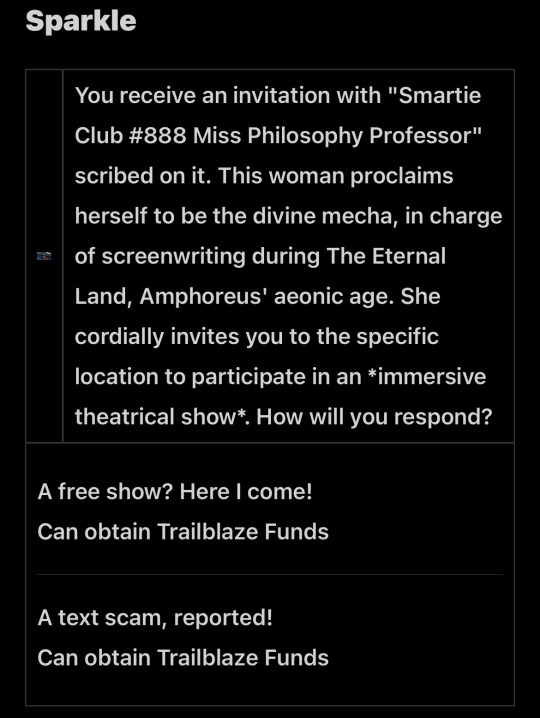
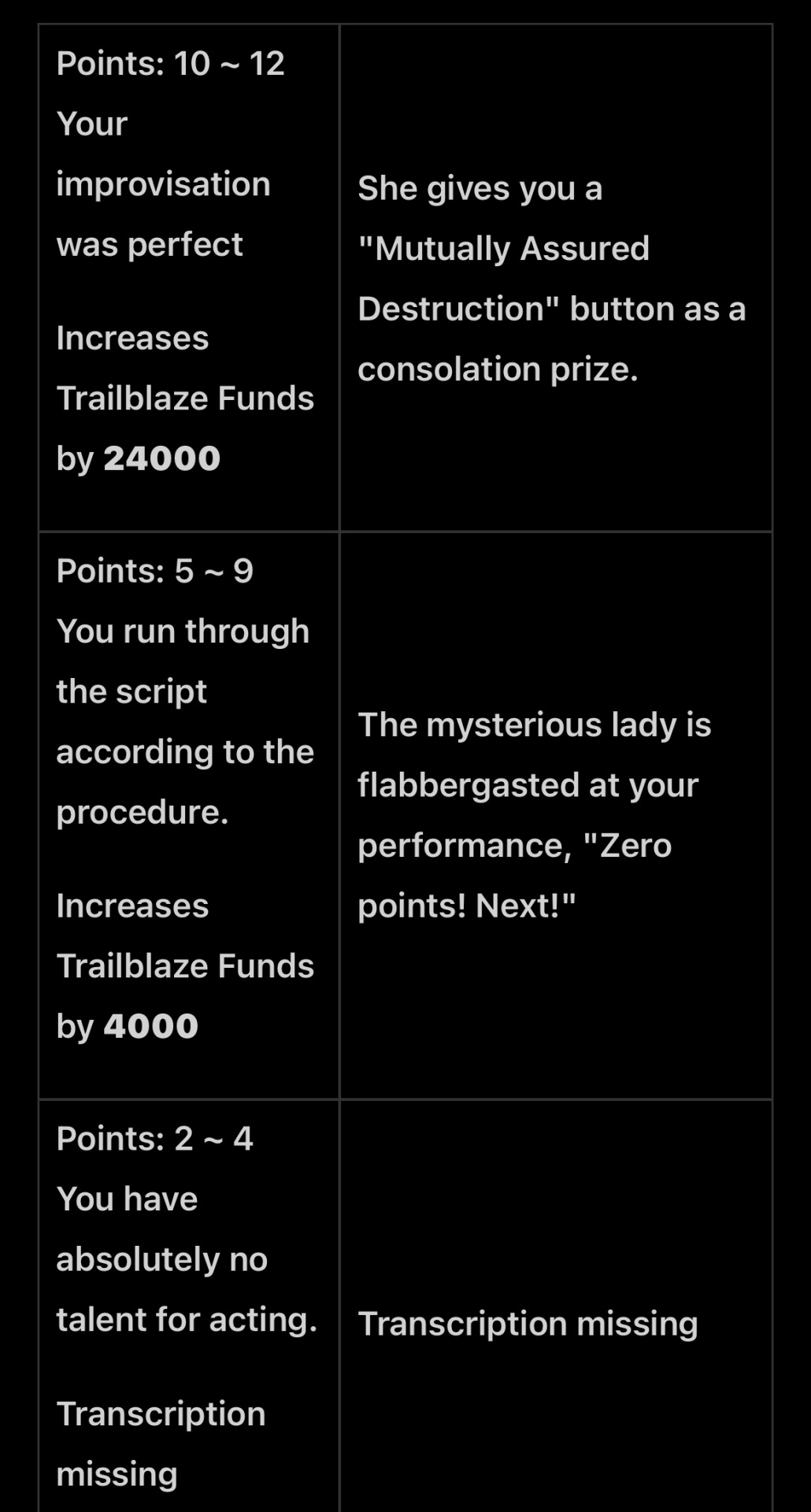
Yup, this is his planet.
I’m well aware it will be like 7 months before we start getting proper leaks about this place, but for now, let’s do some speculation shall we, because if there’s anywhere we are gonna get his backstory/lore/a story centered around him, it will be here.
So let’s begin
Whatever the hell I think is gonna happen during 3.0
A) He will serve as a guide for the Astral Express in navigating this planet
I don’t think he will immediately go to them to help, or they will immediately seek out him, but rather coincidentally or through the connivence of circumstance he will end up helping lead us around, at least partially until we really get roped into a conflict.
Or, it’s the other way around, where we kinda are left to our own devices a bit and then something happens and either by his own decision or something that’s forced upon him, Dr. Ratio now has to supervise from now on.
Personally I find the second option way more interesting and I think it has way more potential for angst so I’m going with that one let Ratio be dragged around by a malicious entity or his own experiences I’m so here for it.
B) Something happens.
Wow, descriptive.
Ok, what I really mean is that something bad happens like a prophecy comes true or the express breaks something or a stellaron comes to eat people’s grandmas and Ratio is implicated in it.
And this is where the fun begins, as the nature of what this something is can completely shift the story in very interesting ways.
Perhaps he was prophesied to doom Amphoreous’s civilization with his presence or something, and was abandoned by his parents on another planet?
Perhaps he has connections to the leaders there who desired for him to be their puppet/tool, so he left to find his own path and now they are trying to force him back.
Perhaps he failed at a test of theirs when he was younger, some universal trait on the planet that he couldn’t live up to and was exiled because of it. Now that he’s back, they blame whatever bad thing happens on Ratio.
I actually really like these particular theories as Ratio has a lot of themes about creating your own destiny, so seeing him resist one forced upon him would be compelling. Moreover, I feel as though an arc demonstrating how exactly he wanted to become a Genius/where he got all his insecurities and motivations from is not only necessary for his character but would flesh out the way we see the path of Erudition in general, even if I already really like the way they have gone with it so far.
C) Resolution/Self acceptance
I doubt they will permanently kill him, it just doesn’t suit his character at all.
However, do I think is he gonna get messed up by whatever that “something” is? Yes.
If the story centers on this remains to be seen, honestly, I doubt it will considering we have the entire cast of the planet and its own lore to meet and learn about, but I do think Ratio will be a major player and I hope how he feels gets some of the plot’s focus as we have quite literally only have 1 full scene of him where we see who he truly is, and it’s all the way back in 1.6 (Ratio-Screwllum conversation my Roman Empire).
Like guys I needed this man bleeding out screaming dying crying throwing up clutching his wounds looking up at the screen like a kicked puppy losing all hope in himself and others YESTERDAY
I NEED SOMETHING BAD TO HAPPEN TO HIM FOR CHARACTER DEVELOPMENT AND BECAUSE RATIO IS SO HIGH STRUNG THAT ANY AMOUNT OF PRESSURE WILL CAUSE HIM TO SNAP SO PLEASE HOYO LET HIM BREAK!!!
He needs another scene where he’s being sincere, he needs a scene where he’s being vulnerable, Ratio’s marble facade needs to crumble to reveal the man underneath and I need that man to pick himself back up again knowing he can allow himself to be human as well AAAAAAAAAA
His connections to Acheron
If you have seen my other posts I have already talked about this at length, however the brainrot for this particular detail is all consuming so let me just demonstrate:
Dr. Ratio has the same philosophy as Acheron, an emanator of Nihility.
Look.
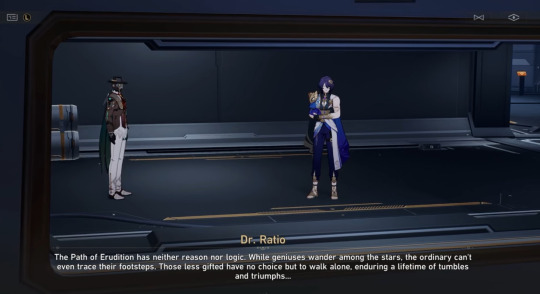
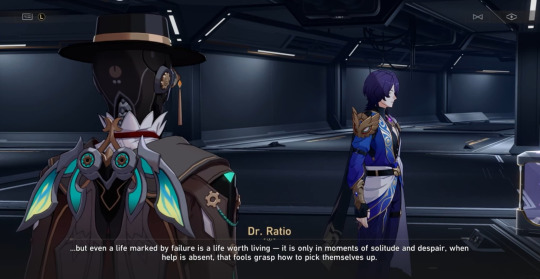


Essentially, they both believe that only in desperate situations will humans reach their full potential and begin to truly live for themselves. Moreover, they also both try and offer the tools to help people save themselves, Ratio with knowledge and Acheron with destroying the dreamscape, and that even if people can only become their true selves through struggle, it is the guidance and love of other people that will allow them to pick themselves up.
Interestingly, pre-2.2 I also believed Ratio was walking the path of Nihility, due to how he engages with knowledge. That very viewpoint spawned from the 1.6 conversation I just showed you, as Ratio demonstrates to the audience that he does not care about knowledge in of itself, but rather the value it can bring to people.
Now, this sets him apart from the Genius Society members, who believe knowledge is inherently valuable and that it is what brings the universe meaning to them. Every person Nous has acknowledged has expressed this belief, which is why they were acknowledged and Ratio isn’t.
Before you say it, no, it’s not that he isn’t smart enough, quite the opposite actually.
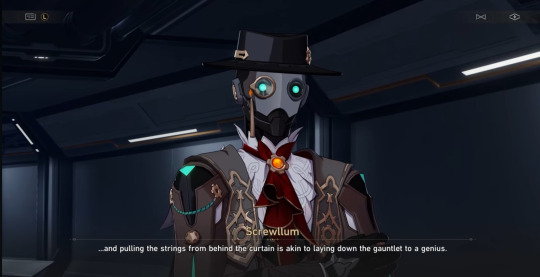
Screwllum himself acknowledges his genius and time and time again are Ratios myriad of accomplishments brought up. In universe plenty of people believe he should have been instated into the society by now as well:
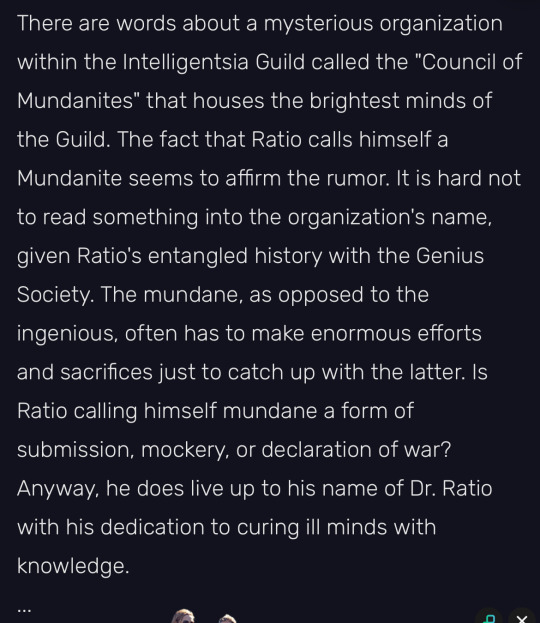
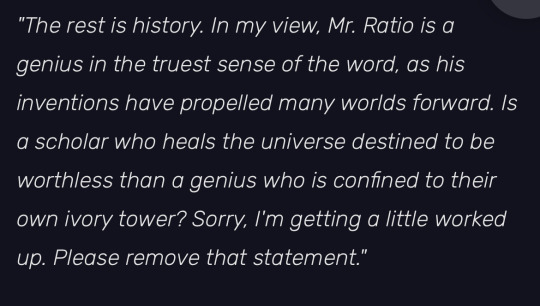
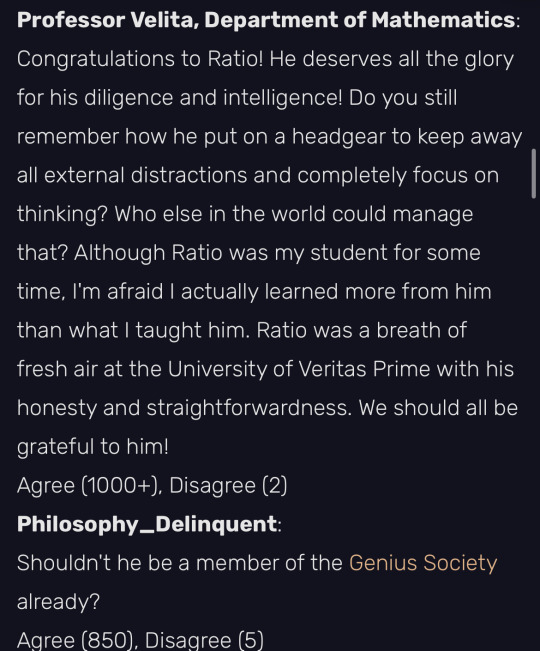
These are just the ones that implicate the society directly, as so many of Ratio’s character stories also mention just how accomplished he is.
Moreover, in 2.3 we are getting a new Sim Uni update made by Ratio himself, centered on humanity because of course it is, therefore he’s even smart enough to do the same things the GS members do, even collaborating with Screwllum to work on their favorite pet project.
So, what does this have to do with his lack of acknowledgment, and the path of Nihility?
I have established Ratio is smart enough and that he doesn’t view knowledge in the same way the other member’s do. Therefore, this difference in mindset is why Nous has never acknowledged him, because as much as Ratio thinks he is walking the path of Erudition, his personal philosophy and behaviors have never aligned with that, even if he thinks they do.
I mean, the man says it himself, even if he doesn’t realize the implications of it:

“The Path of Erudition has neither reason nor logic. While geniuses wander among the stars, the ordinary can’t even trace their footsteps.”
That is the path the Genius Society members walk, the path Ratio is criticizing in this sentence, the path he refuses to travel along himself, because what defines Ratio is that he will never leave the ordinary behind to stumble alone.
That is the path of Erudition.
And Veritas Ratio does not follow it.
So what does he believe in?
Finding your own path. Forging your own future, in the face of a meaningless universe, that is the only thing we should do, the only thing we CAN do.

“even a life marked by failure is a life worth living”
That’s what Ratio believes.
It doesn’t matter if the masses cannot escape their mediocrity, if they will never be geniuses, if their efforts will go unacknowledged, because the universe doesn’t care, therefore they shouldn’t either. There is no grand test, no final destination, no perfect goal people must attain.
Destiny is uncertain, and people’s fates are theirs to choose.
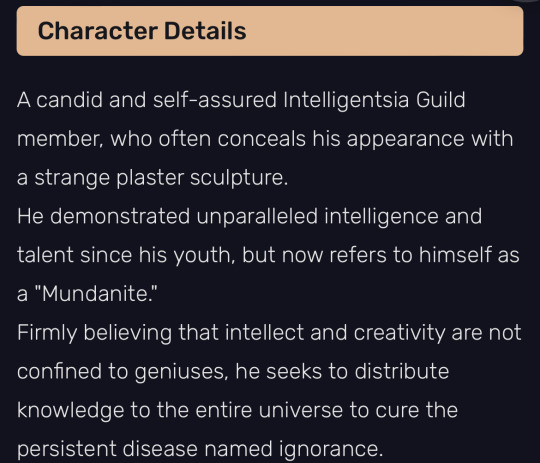
Dr. Ratio believes people can still improve themselves, and that it doesn’t matter if people cannot reach the ceiling of knowledge, as they should still push themselves off the floor and stand up.
He doesn’t think anything confines people from bettering themselves, and that it’s pointless to deliberate over whether one can achieve perfection or not, they should strive to improve themselves regardless and live their best lives because why not? Sure there’s nothing saying they can, but there’s also nothing saying they can’t, and in the face of a meaningless universe, devoid of purpose, one must create their own, and he dedicates his life to aiding others in realizing this.
Ironically, Ratio does not take his own advice. He can recognize the merits of the masses, but he cannot appreciate his own. Ratio is forever walking forward, but he cannot see the path ahead of him, or appreciate the lengths he has gone, the distance he has traveled, and the lives he has improved.
Ratio spreads knowledge across the universe, believing that is what Nous desires, what the Erudition means, or rather should be, which is partly why he views himself as mundane, as a failure.
Not just because he is as ordinary as any other person, but because Ratio thinks he hasn’t succeeded in his goal without Nous’s acknowledgement. I think he believes that he hasn’t done enough, that he isn’t smart enough, that he will never be good enough, therefore no matter what has happened, Ratio is doomed do be as mundane as everyone else, and his accomplishments will never be worth the gaze of the entity who inspired him to help others in the first place, as that’s what Ratio believes they would want.
However, helping others is not something Nous cares about, it’s something Dr. Ratio cares about. Even if he doesn’t understand or acknowledge it, Ratio’s accomplishments are meaningful, and he has walked his path further than most ever have.
However, that path just isn’t the path of Erudition, it’s the path of Existence.
Initially I believed it to be the Nihility, and in a way I’m not wrong, considering one must cross underneath the shadow of the Nihility to find the Existence, so in a way he is still approaching them.
However, as always, Acheron clarifies everything.
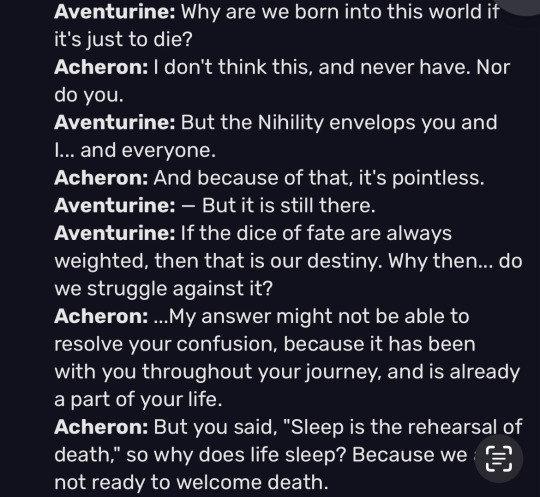
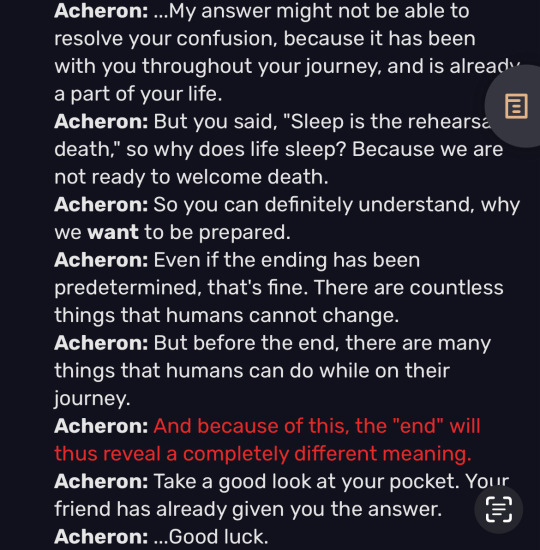
The Nihility envelops all, therefore it is meaningless. And before our final ending, our predetermined destiny (death), we have so many choices to make, therefore we should make them, as it makes both our life and death develop a completely different meaning.
As I have stated, this is what Ratio believes in, even if he attributes it to the Erudition, rather than the Nihility.
Ratio’s entire goal in life is to help others bring meaning to their lives and guide them in the right direction so they can begin to choose for themselves, using knowledge as his means to do so.
Which is exactly what Acheron does, “on the still waters of oblivion, I guide the wandering souls,” isn’t just a line she says because it sounds cool, rather, that is her goal as well. An emanator of Nihility, whose goal is to help others find their meaning in the universe.
But Acheron doesn’t just want that. She is looking for the Existence, and to kill the Nihility (meaningless) forever.
Which is significant, because if Ratio believes the same exact thing she does, and is walking the same path as she is, then like Acheron, he is heading towards the Existence, not the Erudition.
And Nous will never acknowledge him, not because he isn’t smart enough, but because he never followed them to begin with.
In fact, we know what Ratio is, or rather, what he might end up becoming.
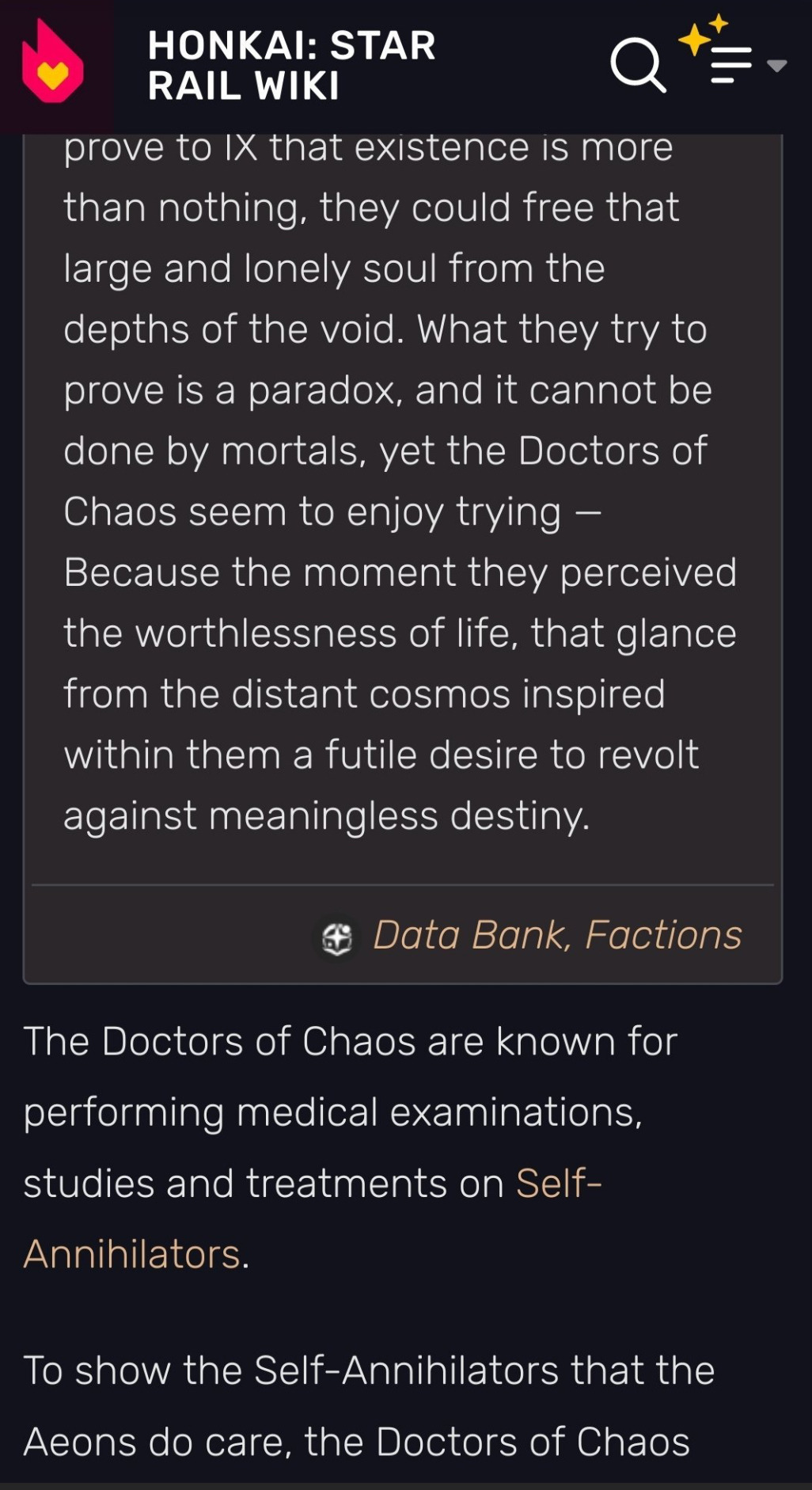
So far no Doctors of Chaos have succeeded in their goals, but perhaps Dr. Ratio, Dr VERITAS Ratio, will be the one to do so. After all, who else could it be but him?
How fitting that the man named after truth would be the one to find it.
That fuckass owl
Glaux I want to throw you into a blender
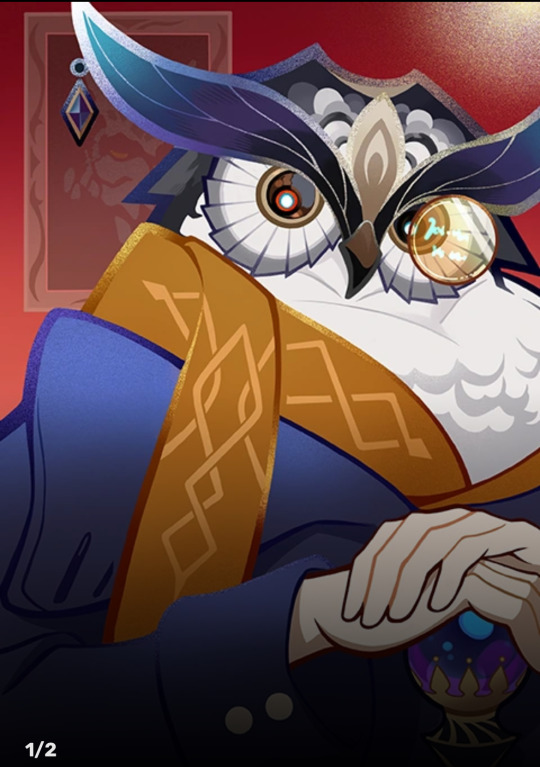
This is Professor Glaux, one of the figures from the Hanunue-Clockie Era of Penacony who did some things like bring the stellaron there, was a scholar of the Intellgenica Guild, became the first dreamweaver, inspired the paper birds, did some shit with the Nightingale Family and presumably died.
I know, horrible explanation, especially considering I haven’t even done the quest this guy is from, but hopefully that’s all the information you need for now so I can introduce you to this theory (which I did not create, sadly I don’t remember who did but it was someone on twitter somewhere so shoutout to them)
That being… Dr. Ratio is Glaux
I hate it I’m sorry. But I will attempt to explain where it’s coming from.
A) Glaux has very similar references to Ratio, aka they are both associated with Greek culture, wisdom and owls
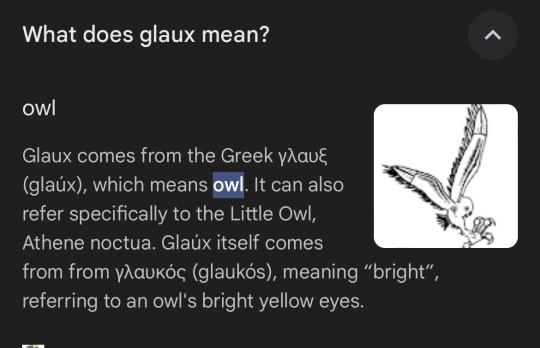
Glaux is the Greek word for owl and they are heavily associated with Athena, the god of wisdom.
Now Ratio has extremely obvious owl, Greek and wisdom association if you have looked at him for any longer than 2 seconds so I’m not gonna bother to demonstrate it, they have similar references, moving on.
B) The Intelligencia Guild + their titles
They are from the same faction, and both are referred to as Professors (ratio gets called that more in the CN version I think), and at least Ratio dedicates his time to spreading knowledge, which I think is something Glaux shared.
C) This occurrence in Gold and Gears
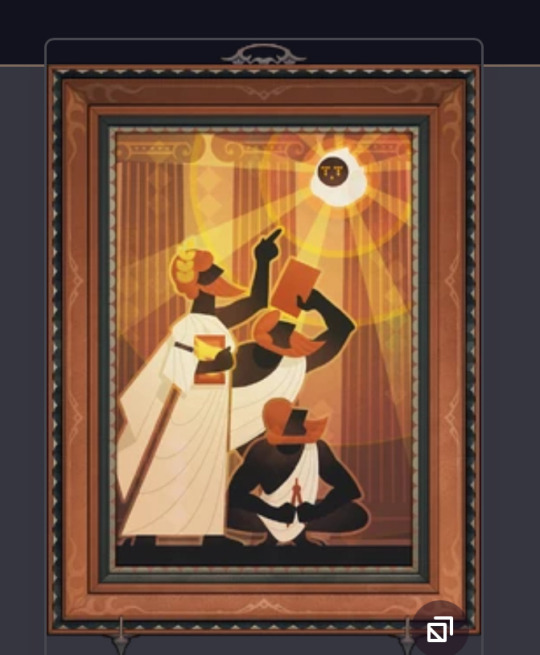
You know, the one where a student kills themself because Ratio thinks they are an idiot.
Well, it’s complicated because apparently the story told in Gold in Gears takes place a long time ago??
How long I don’t know as my brain melted in my skull when trying to piece it together, so please do correct me if I’m wrong, I’ll try to make sense of it later.
Moreover, this is also complicated by the fact that this particular occurrence was used by Herta to teach the trailblazer some mechanics of the sim uni, which makes me thing it’s not a part of the lore/timeline in it in general, and just something funny she added in anyways. Continually, there are also occurrences from characters like Argenti and of the Genius Society members themselves, so I don’t think every event is set in the distant past.
However, I think this idea comes from the other person in that occurrence, Dr. No5, but he also kills himself in it, and I can’t find anymore information on it, so I doubt it. (also apparently in the Chinese version the Ratio they refer to isn’t in the way they refer to Dr. Ratio/the one we know so idk)
Either way, what this means is that if this occurrence did take place a while ago, then Ratio must be super fucking old and he must have been part of the Intellegencia Guild during that time, like a certain owl aka Glaux, who was part of it.
D) Ratio’s weird origins
By weird origins I mean we know jack shit about his past (although we finally know the planet he’s from!) and for all we know the man could have spawned in one day, with some other theories even coming to that conclusion, like the infamous worm theory.
Essentially, if you put this all together, Ratio was once an owl-humanoid named Glaux who was from the Amphoreous, and then became part of the Intelligencia Guild a while back, which is when that occurrence happened. He then went to Penacony, did some stuff, faked his death and like came back as Dr. Ratio on that planet again, which is why we don’t know anything about his origins.
Can you tell why I hate this theory as a concept.
I find it to be dumb, nonsensical, a waste of potential and just straight up random as hell. However it is also objectively valid and could have happened within the plot of the game which is why I hate it so much because please hoyoverse do not go in this direction I will skin you.
However, I do not think Ratio has nothing to do with Glaux.
Rather,
A) The stuff Glaux did on Penacony is meant to parallel how Ratio acted there, as both served as a guiding figure for people on their respective timelines
B) Ratio is the same species as Glaux/ they are from the same planet (Amphoreous).
Now this I fuck with heavily. Yes, Glaux is way more owl looking than Ratio is, however more human versions of his species could exist, and Ratio could just have the ability to like shift forms or something.

He also looks extremely similar to the owls on Ratios design, which I now deem it appropriate to show to you the metric fuck ton of owls in Ratios design.
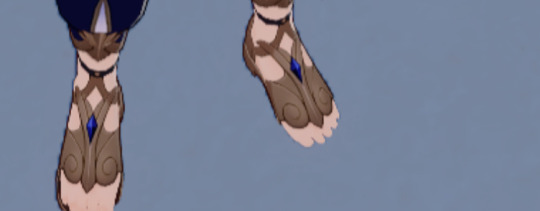
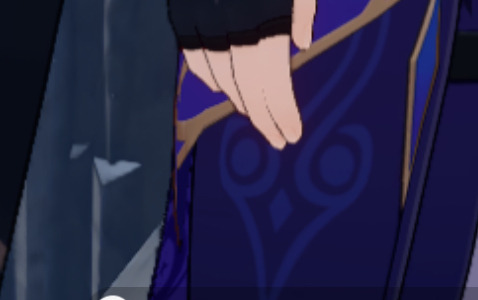
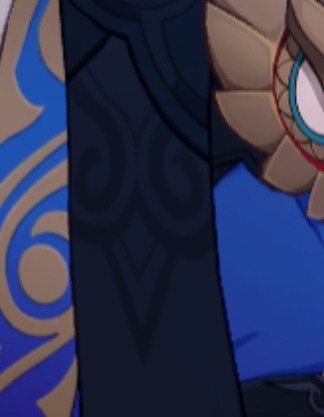
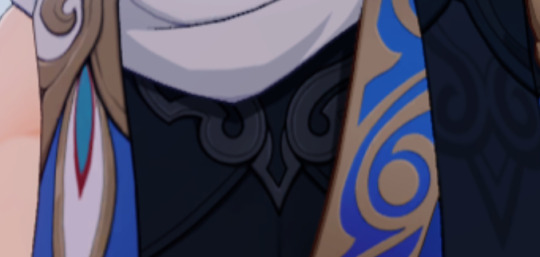
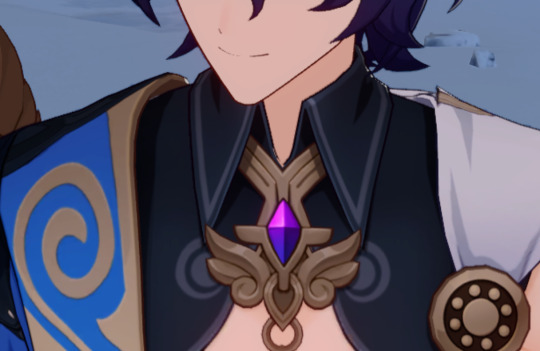
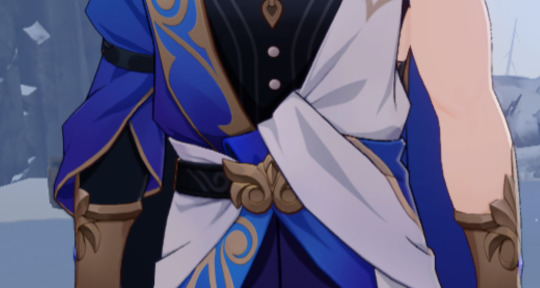
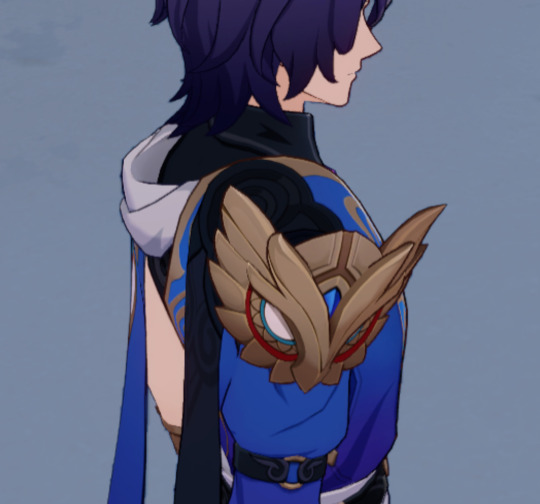
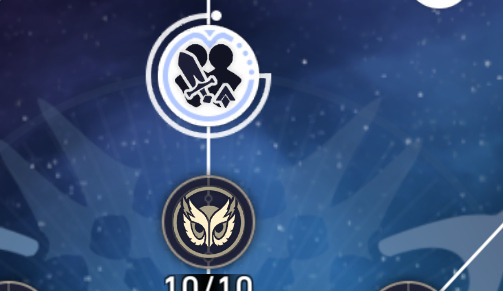
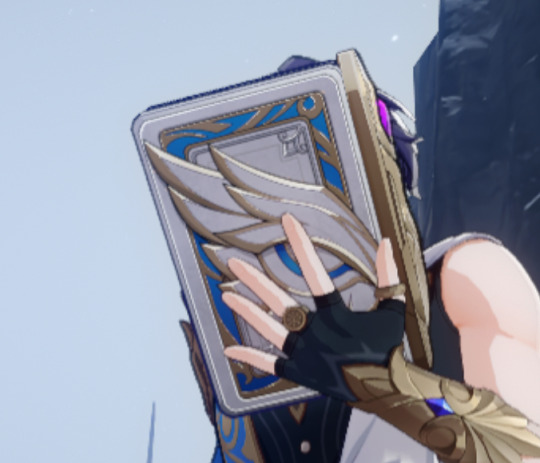
(there’s a few more btw I just couldn’t fit them due to the image limit LMAOO)
Why do you have so many, and why is it the same fucking owl, same culture, same goddess referenced, same symbolism????
Like even if I hate the 1 : 1 Glaux-Ratio theory, they are clearly connected, and this is no accident on behalf of the developers.
Therefore, I would keep an eye out for Glaux mentions in the future, especially on the planet coming in 3.0, as I 100% believe that they are from the same planet. There’s no way they can’t be connected in some manner, and if I am right about this I will be annoying about it for the rest of time.
I can’t believe owl Ratio might actually be a reality.
So uh, let’s put this all together.
We go to Ratio’s planet in 3.0, problems happen and we learn both his past and his connections to that owl species Glaux is from which likely causes even more problems. Bbg probably gets his ass handed to him in 3.0 and 3.1 and gets to make up for it in 3.2, ending the arc off more fulfilled as a person, and perhaps making some realizations about himself including that he isn’t actually following the path of Erudition. Then we skip all the way to endgame when the trailblazers are fighting Nanook and him and Acheron come in with the steel chair hopped up on Existence juice to give the trailblazer enough of a will to live as to not succumb to the Nihility because oh my god how can you defeat the embodiment of Destruction. We somehow win and Dr. Ratio gets married to Aventurine and they ride off into the sunset roll credits we all cheered.
So, yeah.
If I’m even a little bit right about this I will be the most insufferable person on this planet. Anyways I hope you enjoyed reading this, and even if these theories don’t end up being true I do still think the speculation gives a lot of insight into his character.
#honkai star rail#hsr#dr ratio#veritas ratio#hsr dr ratio#dr ratio hsr#hsr theory#hsr leaks#i am insane about this#I will be insane about it#You don’t understand.#GIVE IT TO ME HOYOVERSE GIVE IT TO MEEEEEE EEE#God I can’t wait for 3.0 I need Ratio to get his ass kicked PLEASEEE#HE NEEDS TO SNAP! HE NEEDS TO SNAP!#Aventurine pls save your husband from my delusions thanks#Acheron#Acheron hsr#she always shows up#I swear
296 notes
·
View notes
Note
What do you think about the scene in ep1 where Shauna masturbates on her daughters bed while looking at pictures of her boyfriend? Maybe I'm reading too much into it, but I found it disturbingly similar to younger Shauna sleeping with Jackie's boyfriend
Oh hey, so this response is like perhaps over a year late but someone else asked me about this and I remembered I had 3/4 of this response drafted so hi I’m here now lmao
Anon, I do NOT think you’re overthinking this scene. I actually think there is so much room to think about this scene that a thesis could be written on it. It’s so layered and an incredibly bold choice on the show’s part to include it. It is our introduction to adult Shauna, and I think that the creators of the show clearly felt that it was very important.
This scene made me so uncomfortable as a first time casual viewer that I actually tried to rationalize it away. I remember saying aloud to the person I was watching with “No, that has to be her own childhood bedroom, right? She must be, like, visiting her aging parents?” Clearly I was ignoring the very ridiculous set design of Callie’s room entirely lol, but my mind wanted to find a different explanation. And it took me a while to come around to really loving Shauna as a first time viewer of the show, in part due to how much that scene shocked me.
All that to say, it is absolutely reasonable to find yourself very uncomfortable when thinking about that scene, as many people say that they do when they’re proclaiming that they wish it didn’t exist in the show. But I don’t think that means the scene should be ignored by any means. That discomfort is the point of the scene. Shauna is such a fascinating character, because she swings back and forth from shockingly depraved and cruel, to heartbreakingly kind and loving. She draws both the audience AND the other characters into this unpredictable back and forth with her, and it is easy for us AND them to forget what she is truly capable of when she is in one of her sweeter moments. That is what makes her one of the most fascinating characters of all time to me.
Okay, now we can get into my personal interpretation of this scene. I have always felt it was about Jackie. I think that was clear early on, but, after s2 aired, having more information about Shauna’s relationship with Callie did impact my interpretation of the scene and solidify some suspicions I had.
Shauna clearly does not see Callie as her daughter in any traditional sense. She tells Lottie as much, that she never could fully believe Callie was real and hers. And we see, with increasing clarity as the show goes on, that Shauna views Callie as a peer more than anything. Shauna has both stunted development and difficulty expressing affection. We see her tell Callie that it would’ve been easier if she HAD just had sex with the cop. That’s a very strong indicator of their dynamic. Shauna just doesn’t have the capacity to mother Callie.
That is important context because, with the scene in Callie’s bedroom, Shauna is recreating the thing she used to do when she was young and Jackie was alive. I don’t think she is even thinking about the fact that it’s her daughter’s boyfriend or bedroom, because she doesn’t even really think of Callie as her daughter much of the time. It’s so complex and muddled and, you guessed it, uncomfortable!
In my opinion, people are NOT ready for the intricacies of the ways Callie is a Jackie proxy for Shauna to be developed further. Like the show is establishing it pretty heavily, and I think in a very compelling way, but if it goes down that road more explicitly I have a feeling that people are not going to be able to separate the WAYS in which Shauna sees Jackie in her, if that makes sense.
I think s2 did have some compelling threads of this. Shauna caring for the Jackie corpse doll and getting frustrated and “hurting” her with the ear coming off scene. Shauna not being able to protect her, initiating and endorsing the consumption of her, then hinting at having fears that she’d hurt the baby when she was pregnant, losing the baby, worrying that they’d do to the baby what they did to Jackie, twisting it so much that she can’t help but believe they ate the baby too.
She associated the baby with Jackie very heavily. And in doing so, I think she parentified herself to Jackie in a really fascinating way, like Jackie was her first failure.
If she couldn’t care properly for Jackie, who loved her so much (and became an actual martyr and saint to her), and she couldn’t care for her children who were absolute innocents, then she must be the epitome of horrible and she should squash those caring instincts bc clearly they aren’t actually Good, type shit. That’s how I feel like Shauna spirals into her destructive behavior.
So what happens here, imo, is that Shauna doesn’t really see any of her relationships clearly. I don’t think she consciously thinks of Jackie as The Girl She Was In Love With, and I don’t think she consciously thinks of Callie as her daughter most of the time. Shauna just thinks of them both as people she has loved and failed, as well as people who piss her the fuck off and make her feel trapped in a life she doesn’t want.
She sees a lot of Jackie in Callie, and she acts out in really horrifying ways throughout the entire show to try and gain control, and this scene is one of them. Shauna has always used sex as a way to reclaim control, even when it is absolutely insanely inappropriate, and often when it isn’t at all about actual pleasure. We see more of this in s2, when she BRINGS JEFF TO THE ART STUDIO OF THE MAN SHE KILLED AND FUCKS HIM THERE (that was fucking INSANELY risky and destructive). With masturbating on Callie’s bed, looking at a pic of her bf, Shauna is acting from the same place she was when taking Jeff from Jackie in a way, and I get why that’s uncomfortable to watch. It makes me incredibly uncomfortable, it is SUPPOSED to!
But I think that we are viewing it with so much more logic and thought than Shauna is capable of applying. We draw conclusions from it that are based on a sane person, and Shauna is far from that. I think Shauna is briefly recreating multiple feelings and motivations that drove her to sleep with Jeff as a teenager. The sexual side of things is so wholly Jackie driven, she is constantly seeking ways to feel the way she felt when she was creating that proxy sexual connection with Jackie that she verbatim discusses with Jeff (which is so crazy btw not over that scene). But the side that relates to Callie is driven purely by the frustration and anger. Again, I don’t think Shauna has consciously thought about ANY of it, but if I had to interpret the driving emotions, then I think those would be the most likely.
And I think what it says about Shauna is that she is not living in reality in the slightest. You can not overstate the lack of conscious thought that goes into her actions when she does these things. She is acting on pure impulse, and without any certainty that anything is actually real.
She breaks my heart and this convo about the masturbation scene is so interesting to me because YEAH, that was a ROUGH introduction! and it took me rewatches to allow myself to dig into her character and that’s the point tbh.
On instinct, people either see the actions clearly and hate her, or obscure them to the point of forgetting they happened and love her. But it’s much harder to reckon with them and dig in and come out still loving her.
(I truly can’t believe I have to say this, but I was recently introduced to the fact that yj incest shippers exist, so disclaimer: this is NOT meant to be taken as a romantic or sexual interpretation of Shauna and Callie’s relationship at all. In fact, when I say that I don’t think people are ready for detangling the WAYS in which Shauna sees Jackie in Callie this is exactly what I mean. I just assumed people would wrongly assume it was That and be horrified. I didn’t consider the opposite, and I would like to continue not considering the opposite, so I will prob block anyone who engages with this in that way simply bc I do not want to see it and this is my social media lol)
#I can’t believe my return to tumblr is the question I’ve gotten 10+ times and put off answering for over a year feeling BOLD ig hi guys!!#shauna shipman#jackie taylor#callie sadecki#jackie x shauna#yellowjackets#asks answered
217 notes
·
View notes
Text
People ask me all the time why I’m not a Christian. Why would I possibly be pagan? I claim to know all this stuff about the Bible but I somehow don’t subscribe to it? Do I not believe in Jesus’ teachings?
You wanna know the real reason why I personally feel compelled to not be a Christian? It’s not because I disagree with certain laws or think that Jesus didn’t have any valuable teachings. Despite my differences in opinion on morality, things like being lgbtq, the role of a woman, the importance of witchcraft etc, I could get over all that nitpicky stuff if I felt truly inspired by the story.
There are only two real reasons why I don’t subscribe to the Christian doctrine
1. Return to a perfect past
I find it hard to conceptualize a God that refers to his people as his slaves and servants, I have a lot to say about the doctrine that is supremacy, which lays the foundation for Christian theology, but beyond that, this idea of “God is all good and the only reason anything negative ever happens is because Satan brought death and sin into the world” is actually a very interesting idea to me. Like no, evil and death isn’t natural at all you’re just so used to living in an evil world that you can no longer recognize the original creation. God tells us to turn away from the world because the world is no longer his perfect creation but an amalgamation of his creation with the evil of Satan and man.
I like this idea, but I also think it’s incredibly flawed. It’s typical for many religions to glamorize the ancient past, and believe that there is a perfect beginning.
I think about when my bf buys me roses, I immediately hang them out to dry and let them die. Somehow they seem more beautiful to me that way, in an eternal state of dead perfection, wilted and faded, but somehow still alive in some way. Death doesn’t do us part, I can appreciate them forever though death and beyond. I think about moldy bread, how disgusted it makes me, but how fascinating it is to view up close when you actually pay attention.
In a pre-sin/death world, dead, dried roses and moldy bread wouldn’t be a thing. Is a world without death perfect? Is eternal life greater than eternity in death? Is a painless world perfect to a masochist?
I think that ancient peoples romanticized the past for the same reason we do, they weren’t there. Somehow, it’s more comfortable to believe we fucked up somewhere along the way, and if we could just figure out what it was, we could return to that state of perfection.
One of my favourite stories is Paradise Lost. Within it, when Adam and Eve are banished from the garden of eden, there is a very powerful exchange between the two, wherein Adam says to Eve, despite our sins and the wickedness of the world, I will still love you. You are still the queen of eden to me. We still have each other. The true testament of love is being able to love even in the face of adversity.
Although tragic, I believe this is what humanity has always been doing. Perhaps we didn’t come from a perfect beginning, perhaps we crawled our way to the top of the evolutionary ladder with white knuckles. Perhaps the world has always been perfectly imperfect, and we have still managed to find this divine love along the way. I don’t see the point in desperately trying to go backwards, when these experiences have only made us stronger. The tragedy is the acceptance of cause and effect. Is suffering a perfect invention because liberation was born from it? Christianity says it’s not, that the cost of human suffering was not worth whatever we gained, that satan made an unnecessary and frivolous mistake. I struggle to conceptualize world in which the entirety of human history as it has played out has been a cosmological mistake.
I believe that we are children finding our way, slowly, very fucking slowly, but surely.
and this leads into my second reason.
I honestly don’t really have anything against Jesus Christ. In my mind he is an entirely neutral character, not because I don’t believe in his existence, but because if I believe he is real, I pity him more than anything else.
In my opinion, Jesus Christ’s sacrifice, though a very beautiful and interesting philosophical idea, did not save humanity, and did not set us free. It didn’t save the world and it does not provide us with the tools to save the world.
Within the Christian theology, no man can get to God except through Christ. This is because Jesus died for our sins, he payed the price so we could see salvation. God so loved the world that he gave his only son, so that all those who believe in him may have eternal life. Christianity fundamentally operates on the idea that the sacrifice of the most pure, most innocent, is the necessary price to pay for the salvation of everyone. To deliver humanity from sin, the most virtuous human had to be sacrificed. Humanity had to essentially spiritually cannibalize itself, eat the body and drink the blood of Jesus to be cleansed. And I honestly, absolutely despise that idea.
I say I pity Jesus, not only because of the way his legacy has been bastardized and fetishized on a global scale, (Jesus was God but he was also a human, at one time he was a child. Imagine being a 10 year old Jesus and knowing the implications of your existence) but also because I don’t think his sacrifice saved the world, I don’t think it saved me. Spiritual salvation is a plan to bail everyone out after they die, after revelations. There is no plan to save this world because at least theologically, God does not have faith in humanity to save this world. Jesus’ plan is an escape plan, one that comes to save all the righteous while the wicked burn for eternity.
I disagree, and maybe it’s my naivety. I believe that we can save this world, not by casting out the wicked, but by collectively doing the basic human fundamental, just loving each other. The key to save the world has always been simple. Love has never been a popular movement. Every conflict in all of humanity would be resolved if we all saw each other as kin. Disentangling the systems of oppression and supremacy that have always rotten the world. That means fighting evil, that means tragedy and violence. But just as we have taught ourselves many doctrines over the centuries, I believe, or hope, with enough time, we can teach ourselves a doctrine of love and empathy. I believe most humans are capable of this. And I believe that we can have extra humanity to handle and disarm those that aren’t.
“but Jesus tried to do that and humans killed him!”
They killed Huey P. Newton too. We keep on fighting. Not because we want to be assured in death that we are good people. But because, if there is a chance for a world in which children can sleep on fields of grass and the words “war” and “hunger” are ancient memories, where trees whose names I know can grow as tall as the heavens and water is always clean, then I will fight my hardest to push the world towards that future. And if I die before I see it, then I hope you keep on pushing for me. That is the love that humanity has for itself, and there is no God that can do that for us.
The Bible says that God so loved the world that he gave his only son. I wish that God so loved the world that he came to fight alongside all his children, and didn’t give up until he had finally touched the heart of every human, made them understand the value of this world, the world we have right now, and the life we have right now before it is engulfed in flames. You, all powerful God, could not change the hearts of men? Because they refused you? Because they, in their ignorance, embraced the world that birthed them, and not the stranger that abandoned it? Shook it up and started over, again, because the mess was too ugly to clean up? I don’t believe you.
There are multiple times in the Bible where it says that humans are evil, and I simply don’t believe it. People are born with mental disorders and acclimate to trauma, but I do not believe that people are born evil, and I don’t believe in a God who lets his children burn. Whether that be in a fiery Hell or in the dark separation from light.
It is only through knowledge that we have disabled these beliefs in evil people. You aren’t possessed by demons, you have BPD. You’re not evil, you have autism. We can understand each other if we only take the time to try. And understanding is the one thing that humanity has always craved.
We are children, we are born without understanding and come to know the world as it interacts with us. We have the infinite potential to learn and that’s what makes us so special as a species. Humans, these insatiably curious creatures who will not stop until they have seen every star, turned over every rock, and documented every crevice of the ocean floor. What better creature to inhabit the earth, and who else to save it?
If Jesus died for my sins, thanks. I didn’t ask you to do that, and I’m not going to depend on it. If there truly is a God that is good, then I will prove myself to him though my actions and love towards his creation. And if he deduces that I am evil, I will not use the shedded blood of the innocent to rectify myself. I’m sick in dealing in blood, I don’t have to think in the same terms as a War God.
Idk, maybe that’s just the Luciferian in me.
#luciferism#lucifer#lucifer devotee#lucifer deity#theistic luciferianism#theistic satanism#satanism#pagan#paganism#witchcraft#demonolatry#thoughts#witchblr#luciferian witch#religion#christianity#religious trauma#theology#jesus
99 notes
·
View notes
Text
Character Friction: On “Asshole Characters”, or Shitty Little Guys.
A while ago I floated a few thoughts I had about “asshole” characters in the Indy TTRPGs community. I floated these questions because I had been listening to this interview between Klaus von Hohenloe of The Dungeon Newb's Guide and The Panic Table. In particular, Klaus mentions that some games don’t allow for player friction, and in games where this is the case (cough D&D cough), it culminates in a horrible experience for all involved.
To illustrate, I’m going to talk about some experience I’ve had with my own play groups.

Art from Last Fleet, by Vicentius Matthew.
It might be shocking to hear, but I’ve played D&D once or twice. I remember being in a campaign with two players who wanted very different things from that game. Player A wanted to bring their character on a deep emotional journey, while Player B wanted to act as strategically as possible in pursuit of their character’s benefit, often to the detriment of other members of the party. My own character wanted to track down leads to a mystery that mattered to her, but not really to anyone else. This often led to frustrating moments where characters might not communicate as much information to the party as they might have otherwise, and in other cases one character’s actions could pull the entire party’s journey off-course.
The three of us all played together in a completely different game, three years later - Last Fleet. Let me tell you, the character interactions were completely flipped on their heads. Player A got a dramatic emotional arc around an NPC who was integral to the main plot. Player B got to pursue their own agenda, often in ways that worked against the efforts of other PCs. As the GM, I was given tools that actually encouraged both of these moments: both pushing Player A to wrestle with their relationship and implicating Player B as a suspicious person very early on.

A basic move from Last Fleet.
There are a number of reasons this worked in Last Fleet and not in D&D. One, Last Fleet playbooks often encourage players to keep secrets, work against the benefit of the crew, and fuck up their relationships with each-other. Two, Last Fleet has something called the Pressure mechanic. This is both a resource and a time bomb: you can mark Pressure to improve your chances of success, but hit your cap and your character has to do something to relieve their stress - and that choice is usually rather detrimental to the ship.
Finally, Last Fleet’s a different kind of story. You’re not playing heroic adventurers fighting monsters and clearing out dungeons. You’re playing the last desperate strains of humanity, fleeing an alien threat that has the power to infiltrate your fleet and resemble the ones you love most. Last Fleet is all about how a high-stress situation can lead people to making poor decisions, and, should you desire, it can also be about how people are sometimes forced to rely on each-other in order to get through a harrowing situation.
When I compare these situations, I don’t think we had bad players at the table: we just had the wrong kind of game for the story that the players wanted. I suppose I haven’t necessarily played enough D&D to say that it can’t allow for compelling, flawed characters - what I like to call “shitty little guys” - but I certainly don’t think it’s a play culture that accounts for the diversity of player goals.
More to the point, I find myself really drawn to playing flawed characters - both with them and for them. I love my over-perfectionist superhero in MASKS who lashes out when her friends don’t meet her standards. I adore my Thirsty Sword Lesbian who doesn’t know how to flirt or how to process emotions. I’m having so much fun watching play-testers pick up their various monsters in Protect the Child and demonstrate each character’s struggles when it comes to relating to a kid. I think it’s fascinating that in Changeling: the Lost 1e, a Fairest is rewarded with a discount when they use their Contracts of Reflection to spy on people that they love.
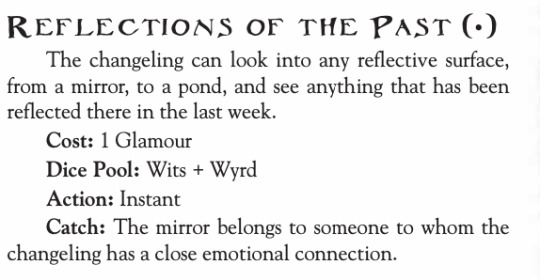
Contract of Reflections, Equinox Road Sourcebook, Changeling the Lost 1e.
I’ve personally seen the most leeway for character friction in PbtA games, like Apocalypse World, Urban Shadows, and Apocalypse Keys. When I brought up the question in the Community post, I asked folks for other examples of playing Shitty Little Guys. Their interpretations were really interesting, and far broader than my initial scope.
@nebmia mentioned that by giving your characters “unpleasant” abilities, it will incentivize them to use those abilities in unpleasant ways.
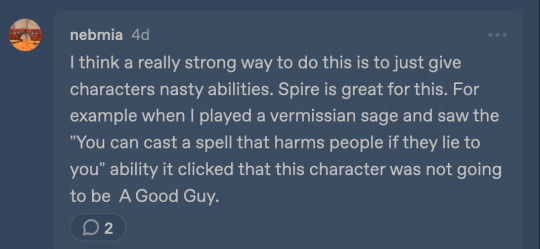
@goblincow has a lot of thoughts about creating little guys who aren’t just horrible, but are also in horrible situations - which gives license for the players to endanger their characters in the pursuit of mischief.
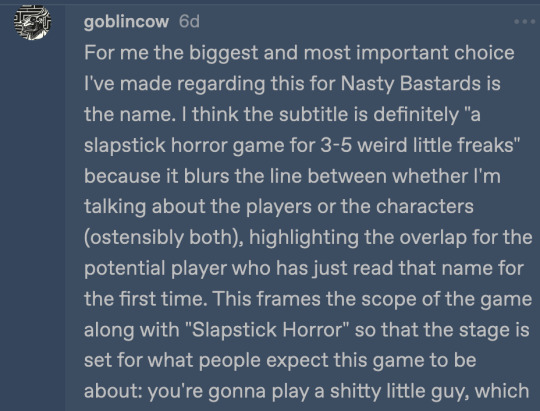
@airkseablade brought up Tenra Bansho Zero, and how it uses something called an “Emotion Matrix” to randomly determine how a player character might reaction to meeting a new person, as well as “Fates”, which are goals that each player is rewarded for playing towards, but mostly based on group consensus.
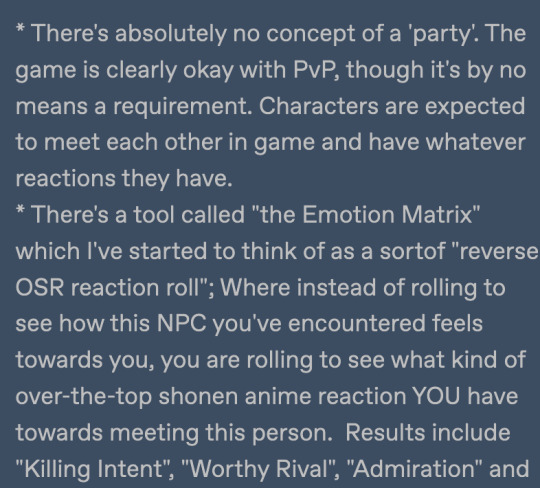
@willknightauthor talked about Wraith: (The Oblivion?), and how each archetype available to players has a part of themselves that pulls them towards darker choices.
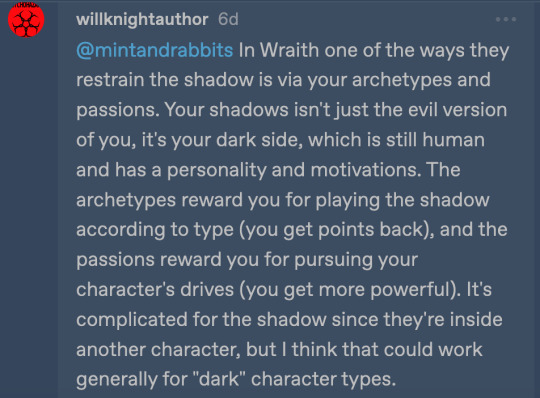
It turns out that we really like playing characters who are mean-spirited, greedy, and struggling to get what they want, and we have a lot of different ways to make that happen. It reminds me of a common piece of advice given to writers when they’re writing a novel - you want a character who’s flawed, because those flaws can be used.
In games like Trilogy or TSL, you might want those flaws because you want to see your character overcome them. In games like Mothership or Cairn, you might want those flaws because then it makes it easier to push your guys through a meat-grinder. In games like Hillfolk or Apocalypse World, you might want those flaws because you want to see just how much well-meaning or desperate characters can fuck each-other up, given the right circumstances.
So what’s the point of all this? What am I trying to get out of this?
When I hear stories about horrible players, the experience I’ve had at my tables makes me want to approach these “trouble” players with a bit of grace. Perhaps these “trouble” players simply want something that is a challenge to provide in a game like D&D, but in Mothership, Urban Shadows, Apocalypse World etc., they might find their choices welcomed and encouraged. And if you've found yourself being accused of being a "trouble" player because you like to a cause drama, perhaps these games might be more up your alley than you think!
Consider playing a game with horrible guys who suck today!
#mint speaks#indie ttrpgs#dnd#tabletop games#sometimes the experience you want is waiting for you#in another game#also thank you luka for embedding the phrase “horrible guys who suck” into my brain#mint plays games
136 notes
·
View notes
Text
The Sound of Music: How the Hellaverse Doesn’t Get Musicals
Despite two generations being raised on the concepts of musical theatre through the Disney Renaissance, it's only in recent times with Disney’s failure to replicate their own formula that people have been compelled to ask why. Why do some musicals work and others don’t? It’s easy to find someone on YouTube talking about musicals and discussing the “I want”/“I am” song without really understanding what that means for the musical as an overall structure. In order to adequately grasp the importance of understanding how singing works in musicals, one must start at the beginning: Opera.
Like musicals, Opera is also broadly separated into two types of songs: Aria and Recitative. Recitative is the part of opera left behind. During the evolution of musical theatre, the operetta adapted recitative into dialogue, breaking apart the songs throughout the story and leaving only the Aria behind. Aria in opera is what are the large musical numbers that are best remembered. The entire story comes to a crawl as a character stands center stage, looks to the back wall, and starts to sing. The Aria was how theatre go-ers would learn about the characters, their motives, and desires. The recitative was often performed like a sing-song narration that could be more or less musical, but the true depth of the story was found in the Aria.
The reason why the story worked was the structural cohesion of getting to know your character in one grand, memorable way and checking in with them as the narration went along. You would see how they changed based on the songs and their progressions. You’d understand why things would change as the songs were coordinated with dramatic events littered throughout the plot. Something would happen followed by a character singing how that thing affected them. This basic structure inherited from Opera is still the structure of Musical Theatre. The Aria further deconstructed into the “I Am” and “I Want” songs. These songs as a basis help offer a deeper connection between the audience and the characters while also adding a sensation of progression with how the songs interplay between the narrative and world.
With the transition to our modern musical theater, we have tightened up the formula of integrating musical numbers and the pacing of traditional theater. Singing should never result in a stagnation of the story. We should constantly be learning something about the characters, story, or world at all times. Music works best when paired with profound moments in the story. The more emotionally heightened a scene or plot point, the more effective it is to express it in a song.
These are just the broad, unrefined general guides to how musicals work, but I believe these are substantial enough to grasp what makes a “good” musical and what is lacking when someone says a musical is “bad”.
On the surface Happy Day in Hell appears to be a classic “I want” song, heavily inspired by Howard Ashman’s Belle. My argument for this comparison being that Happy Day in Hell touches on all superficially similar points as Belle from the unnamed background chorus, Vaggie following Charlie by jumping along the rooftops similarly to Gaston, and the overall subjects the song incorporates such as the emphasis on setting. My points are focused on the superficial and take in account that the context are not identical, but the purpose was meant to be an imitation in some manner. Whether its a homage to Beauty and the Beast or merely a clumsy ripoff, Hazbin Hotel is very obviously copying notes. Which is why it's easy to identify why this song just doesn’t work.
I will preface this portion by recommending Calxiyn Cares Too Much’s video on Happy Day in Hell. She makes similar points to me and, while we do disagree on some points, overall she has more ethos than I do, being a musical theater performer. She is generally more lenient on the music and story than I am while providing more in depth technical critique in terms of rhyming conventions and lyrical pacing. But while I don’t agree with everything she has to say, I do think her video is worth a listen.
To come out and say it, Happy Day in Hell is a disaster of an “I Want” song due to a lack of coherent wants and this is the result of not knowing how writing and stories work. Even divorced from the structure of a musical, the entire message of the song is fundamentally confused and this is in part a failure of understanding narrative structure and misunderstanding what was going on in Belle.
In Disney’s 1991 animated film, Howard Ashman started the story with a magnificent musical number, masterfully weaving in the setting with the desires of the titular character and her conflict with the rest of the world. She is an outsider, both in her own perspective and that of the town. We see her disinterest in them with her line “There’s the Baker with his tray like always with the same old breads and rolls to sell”, layering the delivery with a hint of melancholy and perhaps even a hint of condescension. The lack of variety in her life is a source of resentment to her, not in that fiery passionate sense, but the frustrated impotence that comes with craving experiences over stability. She isn’t a cruel or rude person, but her attitude towards them is that of how someone would regard an NPC.
This is most clearly seen when she attempts to engage the baker in conversation about her book and he waves her off. The little eye-roll and smile as if to say, “Of course” with a shrug of her shoulders. It’s the purest display of condescension without malice. The movie has comparisons of the Townspeople to Sheep, first having Belle interact with sheep instead of the town before depicting the town as its own kind of herd to later outright having The Mob Song with the lyrics “We don't like/ What we don't understand/ In fact it scares us”. The subliminal messaging of their “sheep mentality” is intentional and multifaceted, not just positioning Belle above them by simply setting her apart but confirming that her perceived superiority should be seen as the truth. Belle is a better person than anyone else in town, she is special, that isn’t being challenged.
This is called world building. Belle’s singing is not just telling us about the town, but her feelings about the town and the town’s relationship to her. It foreshadows the finale and sets all the tracks down to move the story along. Belle wants fantasy and adventure, she doesn’t care that she doesn’t fit in whereas the Town’s musings of her shows that her not conforming is disruptive to them. This additionally explains why Gaston and his quest to marry Belle is so supported by the town at the end of the film. Why would they completely go along with imprisoning her father in the asylum unless Belle agreed to marry Gaston.
The opening number made that kind of escalation so natural to where it makes little sense to question motivations of anyone involved in the story. We have a thorough and intricate roadmap of conflicting wants and needs from three major characters in the cast all through the subliminal use of language and themes. So when Belle is literally singing about the town what she is actually conveying are her motivations for her want. “I want so much more than this provincial life.” The character embodying that provincial life is the Town. The Town is what Belle wants to run away from. Gaston is the force trying to keep Belle from leaving the town and pressure her into something that better adheres to the values of the town.
This song is the thesis of Beauty and the Beast.
Similarly, Happy Day in Hell is the thesis of Hazbin Hotel. But what exactly is that thesis? This is where the wheels fall off the cart. Happy Day in Hell doesn’t set the stage for Charlie’s desires and motivations, but rather loses focus and meaning the second Charlie leaves the hotel.
The straightforward response is that Charlie wants to convince Heaven of something to motivate them to do something about her Hotel.
It is unclear what she expects Heaven to do, let alone what she is going to do to get that outcome. In just discussing this question I have been told what Charlie wants is anything from “Convince Heaven to redeem sinners” (like she appears to be doing in Welcome to Heaven) to “Convince them to stop the genocide” (which seems to make more sense in regards to Adam and Lute), however neither of these aspects actually address the main issue of the song number: Sinners don’t believe in Charlie and her hotel.
This issue is also why the actual structure of the episode is just wrong: the B plot has nothing to do with the A plot. While it isn’t always necessary for that to be the case, it actually holds a story together better when they do overlap. In Rick and Morty season 3 episode titled “Pickle Rick”, the family attends therapy and Rick turns himself into a pickle to get out of it. Beth takes the syringe full of an antidote Rick was going to use to turn back into a human after the family left, showing how she doesn’t trust Rick not to abandon her. Beth’s B plot of attending therapy with the kids thus ties directly back to her fears of abandonment and distrust that kicked off the episode in the first place while juxtaposed with Rick’s A plot that, on the surface, has absolutely nothing to do with therapy. However, Rick entering a top secret base is metaphorical to him infiltrating Beth’s emotional fortress. He never asked to be there, and for all intents and purposes he doesn’t want to be.
As Beth locks down her emotions on Dr. Wang, the facility responds similarly. Even more, it is a father who is sent to kill Rick in order to protect his daughter. A plot point that becomes an even deeper parallel in the season five finale where it is revealed that Rick’s tragic backstory of his Beth being killed in an explosion alongside his wife from season 3 was actually true. So Jaguar having refused to work for the Russians and losing his daughter in the process is a direct and intentional parallel of their motivations. The hardships Rick faces throughout the episode from rebuilding his body to destroying a secret Russian spy base are thematically relevant to the B plot of attending family therapy. This episode also places Beth and Rick in a position to have their relationship evolve through “Froopyland”.
”Pickle Rick” was emotionally and thematically necessary in moving the characters to a place where they could change. And that was masterfully rafted through parallels between the A and B plots. So when it comes back to structuring “Happy Day in Hell”, it makes no sense for Charlie’s plot to focus on convincing Heaven to do anything. It makes more sense for her to be trying to convince Sinners to come to her hotel and attempt redemption. If she is trying to convince Heaven to redeem sinners, she should have sinners who she thinks are ready to be redeemed. If she is seeking a ceasefire from the exterminators, then she should have a hotel with more than one resident to show that there is a desire for redemption within Hell. If anything, the song reaffirms that Charlie’s plight is pointless.
Because of this confusion and lack of focus, Happy Day in Hell is a weak thesis for Hazbin Hotel. It apes on structures it doesn’t understand, telling a story it hasn’t earned, and fails to thematically connect the two plots of the episode despite having both leads in Vaggie and Charlie singing together. Structurally, the song foreshadows the fumbling of the rest of the series’ major plot and world building. It lacks an understanding of why musicals are the way they are and fails on even a surface level to comprehend the important role of musical diagesis And its inherent limitations in storytelling on top of failing to structure the music thematically to the character motivations and overarching plot.
Visual Storytelling is an intricate circus of multiple mediums coordinating together in a delicate balance that can corrupt the entire production by just one mistake in the visuals, pacing, writing, or music. All of these categories have their own completely unique set of rules that only become more complicated when trying to be used in tandem. And to have a director not understand the fundamentals of ¾ of those categories results in a sloppy cacophony of poor choices.
#vivziepop critical#helluva boss critical#helluva boss criticism#hazbin hotel critical#vivziepop criticism#helluva boss critique#spindlehorse critical#vivienne medrano#vivziepop#hazbin criticism#hazbin critical#hazbin hotel criticism#hazbin hotel critique
95 notes
·
View notes
Text
marauders era unpopular opinions, once more
i really don’t like fanon regulus. i don’t like him being helpless and kind and a sirius variant. he’s morally grey, leaning towards morally dark, he’s selfish, he agreed to his parents’ and voldemort’s ideologies, having joined the death eaters most likely by his own will (unlike draco malfoy). but obviously, everyone is allowed to characterise characters the very way they want to
and while we’re on it, i don’t like evan and barty either, for the same reason. maybe i would, if they were realistically characterised (i LOVE reading morally grey or morally dark(er) characters), and once again, i believe that just because one likes a character, that doesn’t always mean that the character is a good person
and continuing on the same topic, the sunshine james potter, although being a topic that i like and delved deeper into myself, is nice, but i would also love to see more of arrogant, spoiled james potter, too
not liking severus snape and peter pettigrew but liking evan, barty and regulus is kind of hypocritical
i don’t like jegulus
i also don’t like the casanova, bad boy characterisation of remus, and the helpless, needy characterisation of sirius either. to me, they’re out of character, overly done and absolutely not enjoyable
and because i earlier mentioned severus snape, i think he’s an interesting character, actually. that doesn’t make him a good person (once again, i believe him to be morally grey, too) and i can’t call myself a lover of his, however i find his story and character very interesting and compelling
i don’t like a lot of the wolfstar dynamics in current fandom
“we need more content about the girls!” literally do it yourself. please. whenever i write content about the men, i get a wave of new followers, and whenever i post about the non-men, suddenly i have tebs of people unfollowing me. oh, and my posts about the men have twice or thrice the notes of the other ones
sirius > regulus
and speaking of which, sirius is such an interesting character, and he was reduced by many people to nothing, or whatever is relevant to the plot
james would pick sirius over regulus any time, with literally no hesitation
i don’t care about popular fics (read or don’t read, i generally don’t read popular fics to be honest), however i do care about the way creators, especially writers, are treated in this fandom. i made a few posts about this topic, feel free to ask me to link them to you, but the way some people feel entitled to fic and fandom content is horrible
“x is the female version of— !” please stop. i’m going to stop you right here.
stop tagging jegulus and wolfstar and other mlm ships with wlw and nmlnm tags, for god’s sake. you’re just clogging the tag, and if i came looking for a certain ship, that’s what i’m going to expect to find. besides, why would you tag jegulus with, say, pandalily, when jegulus is by far more popular?
jegulus < jily
#feel free to ask and discuss any of these opinions with me as long as you are being respectful#anti regulus black#anti barty crouch jr#anti barty crouch junior#anti evan rosier#anti jegulus#sirius black#remus lupin#james potter#peter pettigrew#marlene mckinnon#dorcas meadowes#lily evans#mary macdonald#severus snape#marauders era unpopular opinions
729 notes
·
View notes
Text
The Hero with Dead Parents is not Cliché, it’s Necessary
The staggering number of protagonists in sci-fi and fantasy with dead parents grows every single year. Frodo Baggins, Harry Potter, Luke Skywalker (before the retcon in ESB), almost every Disney Prince and Princess, the Baudelaire children. Beyond the realm of fantasy into action, thriller, romance, mystery, slice-of-life, and bildungsromans.
Dead parents, or parent, is the curse of being the hero of the story and for a very good reason:
Parents are inconvenient as f*ck.
Unless the mom and/or dad is the villain of the story or the entire story is about the relationship with the parent/parents, the “dead parent” trope serves many purposes and while it may be “cliché” that doesn’t mean this trope is bad or, in my opinion, overused.
It’s one less liability the hero has to worry about protecting
It’s one less obstacle in the hero’s path to their adventure
It’s one (or two) less characters to find excuses to stay relevant in the story
It’s a juicy backstory a lot of people can relate to
Trauma. Is. Compelling.
It’s an excellent motivation
And their murder is an excellent inciting incident
Living parents and guardians get killed off both for internal plot reasons, and meta writing reasons: Living parents are a pain in the ass to keep up with. You’re stuck with a character your hero should still keep caring about, keep thinking about, keep acting in relation to how their actions will be seen and judged by that parent. That parent becomes an obvious liability by any villain who notices or cares.
Living parents can of course be done well, unless they’re the villain, but they just kind of sit there on the fringes of the plot, waiting around to be relevant again and they kind of come in four flavors:
There when the plot demands for pie and forehead kisses (Sally from Percy Jackson)
A suffocating but well-meaning obstacle in between the character and their independence trying to do right (Abby from The 100, Katniss’ mom from Hunger Games, Spirit from Soul Eater)
A mentor figure (Valka from HTTYD 2, Hakoda from ATLA)
The only rock this character has left (Ping from Kung Fu Panda)
*Notice how many of my examples lost their partners shortly before or during the plot, thus still giving the hero the “dead parent” label.
Most of these are self-explanatory so I’ll say this: I think this trope gets exhausting when the parents are written out without enough emotional impact on the hero. These are their parents and a lot of the time, the emotional toll of losing them isn’t there, like just slapping a “dead parents” sticker is all you need to justify a character’s tragic backstory and any behavioral issues they might have.
Like, yes, the hero has dead parents, but you still have to tell me what that means to them beyond obligate angst and sadness. When the “dead parents” trope reads as very by-the-numbers, usually the rest of the story is, too.
How present the parents were in the character’s life should be proportional to the death’s impact on the narrative (as with any character you kill off). If they were virtually nonexistent? No need to waste a ton of time. If they didn’t matter to the character before, they don’t need to matter now unless the plot revolves around some knowledge or secret their parent never shared.
Sometimes, the hero’s dead parents are a non issue. Frodo being raised by Bilbo doesn’t impact his character at all. It’s a detail given and tossed away. On the other hand, sometimes the entire centerpiece of the work is revenge/justice/catharsis surrounding the parent’s death—Edward and Alphonse Elric’s entire story is defined by the consequences of trying to bring their mother back from the dead.
As someone who kept one of my protagonist’s parents alive and didn’t make them villains just to spite the trope, I have all the more respect for this enduring legacy of fiction. You can of course keep the parents alive, but I don't think it's seen as lazy or cheating or taking a shortcut just killing them off, so long as you remember that your hero is human and should react to losing them like a real person.
#writing advice#writing resources#writing tips#writing tools#writing a book#writing#writeblr#character design#character development#fantasy#scifi#dead parents
206 notes
·
View notes
Text
Ravenous is Haunted
Within the lore of Ravenous, eating people causes you to “absorb [their] spirit,” but what does that mean in practice?
Ives mentions that eating someone brave gives you a surge of bravery, which is exactly how Boyd goes from too scared to move to single-handedly capturing the enemy command. The spirit of his fellow soldiers and specifically his commanding officer compel him to do it. But we know that this personality shift is not permanent, it abates. However, I believe that there are other more subtle influences that remain.
There’s a whole collection of things Boyd, Ives, and Hart do and say that mirror the actions and words of the people they’ve eaten…
The protectiveness that Boyd shows towards the Fort Spencer crew after Ives arrives as colonel is a new trait for him and highly reminiscent of Reich’s protectiveness towards Toffler. From the moment he’s stuck with Ives at the fort, Boyd also immediately decides to murder him, the thing that Reich died furious at him for not doing, and never strays from this mission at all. Boyd and Ives both headbutt each other in their final fight, a Knox fighting move, and Boyd also attempts to strangle Ives at one point, which is Reich’s. Another example that I like is when Hart says to the chickens he’s feeding “run away! run for your lives!” which is what Toffler died doing. These are all small moments in isolation, but together they form a compelling picture.
For another thing, you have Boyd mentioning to Hart near the end the “nightmares” he’s “still” having about Reich, Cleaves, and Knox. These aren’t just random trauma nightmares, they are specifically about the three people of the Fort Spencer crew that he’s eaten. And, considering how strongly Hart reacts to the mention of this, he is likely experiencing the same thing. Since it is canon that they have actually ABSORBED these people by eating them, I don’t think it’s a stretch at all to call this a haunting.
Put these together and you have the people who have been eaten haunting the cannibal characters at night and maintaining at least some sway over them by day, often without them even realizing it… Fun stuff!
As far as Ives goes, I think that he is less affected by this phenomenon than Boyd and Hart are. He’s been eating people for much longer than they have, he has no moral compass whatsoever, and he has a very strong personality, so he’s not gonna let a little haunting get to him. That being said, who knows what quirks of his personality we might be able to attribute to people he’s eaten in the past if we knew more about them? I also think that his assumption that he is unaffected by the people he eats is a part of his downfall, and I’ll explain that in a moment.
The last thing I want to talk about is the bell because that’s what REALLY gets me mmmmmmmmmmm… SO! During Boyd’s fight with Ives, there’s a moment where Ives has fled the room they were fighting in and Boyd doesn’t know where he is, so he’s checking behind all these random doors and not finding him when he hears a bell ringing in the courtyard. He goes out and sees the ringing bell but no one near it. Instead of going towards it where he knows Ives is likely waiting for him though, he walks towards the barn, as if in a daze. When he enters, he sees the bear trap and gets an “Aha!” look on his face.
Now, who do we know who is associated with both that bell and a bear trap? It’s Reich! He is the only person we ever see ring that bell and (in a deleted scene) he uses bear traps as target practice, shooting at them to snap them shut while Boyd watches. So, at the very least, we can say that Reich indirectly inspires Boyd in that course of action.
BUT, because I am me, I’d like to take it a step further by proposing that, since Reich is haunting both Boyd AND Ives, he influences Ives to ring the bell (with Ives not consciously thinking anything more of about than “this will surely get Boyd’s attention >:)”) and then influences Boyd to walk over to the barn instead of immediately continuing the fight so he can show him how to end it once and for all. Boyd asked Reich to “tell me what to do,” and Reich answered him!
I did also write a fic about this concept a few years ago if anyone is interested!
#ravenous 1999#hopefully this will reach everyone who expressed interest in this idea!#i am TRULY obsessed with it… this is my exclusive reading of the film now#i’m not claiming it’s 100% canon - but it’s also not subjective to me#Ravenous Ghosts REAL!!!!!!!#i also do like the idea that the eaten people can manifest in people’s nightmares individually or come all together to Yell At Them#depending on the circumstances… depending on the vibes…#but yeah tldr: Reich’s ghost rang the bell… to me…#oh ALSO if you’re gonna read the fic - please watch the deleted scenes first#it does NOT make sense without them#particularly without the extended Slauson scenes which i still think should have been in the final film#which imply that Slauson absolutely knows that Boyd Did A Survival Cannibalism#and very possibly believes that the rest of the Fort Spencer crew WERE murdered#but pressures Boyd to cover it all up for the sake of the economy (which is also to Slauson’s own benefit)#and uses the cannibalism thing to blackmail him#it’s sooooooooo good#but yeah… honestly leave it to me to publish a fic that makes zero sense unless you’ve seen four deleted scenes#AND are aware of my highly specific Ghost Analysis…#iconic - truly
82 notes
·
View notes
Text
Greg Bryk was in episode 25 of Podcast141, co-hosted by Marwen Heni, Mars Lipowski, and Jim Boeven, to talk about his acting career in general, but also and mostly his role as Joseph Seed in Far Cry 5.
Since he’s already shared a lot of anecdotes in interviews and live videos on Instagram, I thought I wouldn’t learn anything new... but I did, so here’s a summary of what he said about his experience playing the Father.
We knew that the dev team (he specifically mentioned Dan Hay and Drew Holmes) had struggled to find the “right” actor for the role, but what I don’t remember ever hearing before is that, after two years of unsuccessful search, the project was almost cancelled for this reason!
Thankfully, that was when Greg Bryk auditioned. He had already said the script they gave him (and that he thought was “amazing”) was what became Joseph’s monologue in the mission “We Must Be Strong”, but he gave more details about what was originally in it. In this early version of his backstory, Joseph was 23 years old and working two jobs to support his family. One night, exhausted, he fell asleep on the couch as his pregnant wife went out to get ice cream. He was then awoken by a knock on the door, told she had been in an accident, and taken to the hospital. The rest of the story is what he says in Far Cry 5: when he arrives, his wife is dead, their premature daughter is “stuffed with tubes”, he hears God’s calling, and understands he has to make this sacrifice.
So he got the role, and when they called him again to record a sermon (my guess is it was this one, but I’m just speculating), he saw what the game looked like and thought everything and everyone was “incredible”. Over time, as they got to know him, they even changed the character and partly rewrote the Father specifically for him.
The team was also very accommodating. For example, the scenes are usually shot in the huge performance capture studio, but for the Heralds’ eulogies, which are much more intimate, they built a small room so he felt like he actually had something around him instead of a big, empty space.
A day before the game came out, the cutscenes were already available online and he watched some of them. He was very impressed by the last eulogy (or, as he calls it, “snot monologue”) in particular because of how “vivid” and “human” it felt. It brought tears to his eyes and he recalls his wife was “blown away”; it was “special”.
As for the fans, he thinks they’ve been very supportive and welcoming. Some have told him they felt heard and seen by Joseph, and he believes it’s because he’s a character who loves people for who they are. At this point, he and the co-hosts agreed that being an actor was a gift because it gives an opportunity to make people’s lives better, especially in video games because there’s a unique connection that doesn’t really exist in movies or TV series.
Marwen Heni mentioned that, while most villains want you to hate them, Joseph, on the contrary, wanted you to reflect and think that he might be right. Greg Bryk admitted that he believed everything he said, especially about family and technology. Sometimes, people are isolated or only have online connections, so having someone tell them, “I see you and I love you for what you are” is powerful. In his opinion, this message resonated with a lot of players because it’s a simple truth and we all want to be part of a family.
Joseph doesn’t control his followers with fear, Marwen Heni commented, but with devotion, and that too makes him compelling. As he was playing Far Cry 5, he started questioning whether or not he (as the Deputy) was right for opposing the Father, which is something Greg Bryk says he saw a lot in comments. He believes there’s “an intimacy to the relationship” between Joseph and the player, a “seduction” in the sense that we all want to belong. He’s humbled by the impact his work had on people.
When asked if he would be open to reprising the role, this time, he answered, “Absolutely”. In fact, and this is news to me, he revealed there were discussions about turning Far Cry into a TV show, and the different games would have been standalone seasons. That said, he added that, at a certain point, it’s necessary to let characters go and that he was grateful for what he had already experienced playing the Father.
Marwen Heni then asked if Joseph, who is very complex, was entirely fictional or if it was Greg talking through him. He answered his characters are always him, to a degree, because he wants to connect with the material so he never lies and can work from things that matter to him. He never judges them and tries to think about what he wants to express through them. He’s interested in their humanity and what motivates them. “We’re all broken,” he said. “Some are much more broken than others, and sometimes those broken pieces are very sharp and jagged, and they lash out.”
He also revealed he had “very specific rituals” to help him become a character and then let them go. He mentioned a few prayers that one of his friends, who is a Wiccan, taught him. In fact, and all the co-hosts agreed, it can be very hard to “disconnect” from a character sometimes because actors aren’t just pretending; they’re using real emotions.
He had already said his son Dempsey had done the mocap for John and Jacob in the Collapse DLC and that he felt carrying Ethan’s body in New Dawn was a way for him to honor his “boy”, his dead dog Lucky, since he deeply regretted that he couldn’t be there to take him to the veterinarian the day he passed. What I didn’t know, however, is that it was Greg himself who had asked if Joseph could carry Ethan, and the team made it happen. He also explained that, when it was time to play this scene, he tried to imagine what it would be like to actually lose his son.
But who is Greg Bryk’s favorite Far Cry villain? Well, when he auditioned and started researching the franchise, he was interested in Vaas because of Michael Mando’s performance. He still doesn’t know him personally but has a friend who worked with him and who spoke about “how electrifying his talent was”. There’s something “unhinged” and “primal” to him as a performer; he’s a “wild” and “special” actor.
Finally, when told he was born to play Joseph, he confessed he felt he was indeed “called” to play this part but wants to give credit to Dan Hay, Drew Holmes, and Jean-Sébastien Décant for creating such a “terrifyingly human” antagonist in the first place.
#guys... the 'eulogy box' is real!#greg bryk#podcast141#marwen heni#mars lipowski#jim boeven#joseph seed#far cry 5#michael mando#vaas montenegro#far cry new dawn#far cry 5 spoilers#far cry new dawn spoilers#far cry 6 collapse#joseph collapse#dan hay#drew holmes#jean-sébastien décant
110 notes
·
View notes
Text
What would have made the Veilguard companions more compelling?
I keep racking my brain trying to determine how the marketing of this game was so focused on the companions, their rich lives outside of the narrative, and the journeys that they go on when I think that they are objectively the worst written companions to date. Not to say that their appearances aren’t well designed or that they don’t have really fun and cute moments, but they are simply less three-dimensional than previous companions. Fundamentally, my biggest grievance with the Veilguard companions is that I just don’t find any of them nuanced or interesting. They are all good people, but they are not good or believable characters that fit this plot and interact with it in meaningful ways.
I have never been one of those people that ignore canon, but I have been perseverating on the missed potential of this highly anticipated game that we’ve waited ten years for. So, I wanted to criticize some of these characters and explore some changes that might’ve made for a more compelling group of characters had they been written differently, but (hopefully) respecting the vision of who the characters are at their core because I do think that the skeleton of something great is here.
Disclaimer because this is long and critical: There are a lot of spoilers below. I haven’t read all of the Dragon Age books and I could be missing things, but I also think that the game and the characters’ journeys should speak for themselves as we go through the story. I also get that these are just my opinions, I’m a STEM girlie by trade and a creative on the side! Not everything I suggest may be great or realistic for building a plot or realistic for writing the script of a videogame. I also don’t mind conversations about these characters! I think that would be fun, I just don’t want to be shat on for being very disappointed in this game when it’s been my favorite video game series for half my life and I went in very hyped and willing to excuse a lot!
Alright, if you’re still with me, buckle up!
First, before I outline the specific changes I would make to each character, I want to address that there are just flaws with the way BioWare decided to handle companions as a whole in this game. I want to mention them now because they impact nearly every character and I don’t become repetitive:
1. Most importantly, the approval system is pointless and probably could be left out of this game for all it means to the narrative. It is nearly impossible to wrack up disapproval for the companions and you increase approval and bond by just taking companions out and completing a quest. If the companions like nearly everything that Rook does, then it means that they don’t care enough about anything to have strong rigid opinions (which is good for a well-written character). If companions don’t have an opportunity for meaningful agreements or disagreements, it means that the writing is not what people expect of a Dragon Age game based on every single installment we’ve had so far. It is one of the few things that have stayed the same in all of the past games and one of the things that I think fans are really upset about and should have been nonnegotiable.
2. All of the factions (except for maybe the Grey Wardens) really just needed to be messier and more complicated. Not all of the factions were meant to be heroic throughout the series. As others have commented, the Lords of Fortune and the Antivan Crows are the most glaring examples of this. However, I think that the Mournwatch and Veiljumpers are not exempt from this either. The factions serve as crucial parts of our companion’s backstory and by sanitizing them, we are wiping key opportunities for character development. For example, it could be way more interesting to have a character who fundamentally disagrees with their faction, but doesn’t know how to escape it. Or, what about a character who loves their faction and makes us feel conflicted about them because of their willingness to explain away the faction’s history? I could write (another) essay on this, so I’ll leave this point here.
3. We simply needed to have more conversations with all of the companions. All we have are these short, uninteresting cutscenes to learn about the companions. The player should be able to go up to the companions and ask them about the history of their faction, who they trust and care about in their faction (and why), their past, and their opinions about new information (on other companions, side quests, and plot points). None of these even need a cutscene, just voice acting. It would also help players feel more connected to the companions.
4. There needed to be more visible personal and interpersonal conflict. The companions read like coworkers to me. They mostly like each other and, even if they do have disagreements, they are never explored in the narrative. They don’t seem to have any hugely conflicting viewpoints on any topic and, even if they do, they are benign. For example, what to pack for a camping trip or not wanting to talk about a particular topic (dragons vs. spirits) can be interesting in addition to more complex banter but the banter just feels inappropriate and irrelevant for the plot of this game. Overall, the companions rarely make a fit about anything. It feels like the writers didn’t want any character to appear problematic, but they made them flat because none of them seem to have a hill to die on except that they should save the world. This might have been fine in a game series that didn’t focus so heavily on companions and the way that ethics are shaped by personal experience, but this is not that imaginary game series.
5. The companion quests should have focused more on worldbuilding and getting to know the characters. I have little to say about this other than that the quests for Harding to try out her powers, training Assan with Davrin, shopping with Lucanis, and lighting candles with Emmrich, etc. were lazy, uncreative filler. I really cannot put it any other way. They should have all had quests that better explored their faction and, by extension, them. We barely learn anything in those quests and they are time wasters. Those are the scenes that should have been converted to a codex entry, not some of the important lore drops that we currently have in the codex.
6. Rook chooses one option of a binary for every companion towards the end of their personal quests. I’m okay with some of these, I think that it made sense for Bellara and Davrin to ask Rook what to do in their personal quests because it felt more natural. A friend asking a friend for their input. On the other hand, some of these are really inconsequential, semantic, and mindset related (Neve) and others are such personal choices that it feels inappropriate for Rook to be involved (Emmrich and Lucanis). In a lot of these cases, it would have made more sense to have dialogue options sprinkled throughout the game that influenced companions to make their ultimate choices. Giving Rook so much power in these decisions makes the companions feel one-dimensional because it strips them of agency that any believable character would want. Even if they wanted Rook to make these decisions, companions should have felt more strongly towards the options and either praised or disparaged Rook for their decision.
7. Finally, I found all of the romances very lackluster. I was never someone who considered Dragon Age games glorified dating sims (I actually really don’t like that take, even if it's all jokes), but I found myself missing the depth of relationships in previous games. All the relationships felt too new and shallow. Largely, I think this is due to points 3 and 4, but also due to a lack of reactivity with your companions. For example, companions barely acknowledge you getting them a gift or flirting. This could have also been helped by a few extra cutscenes with the companions.
That mostly covers the overarching issues that apply to all characters. Some of these things might come back in my individual discussions of the characters if it is particularly bad.
If you’re still with me, here are my thoughts on each companion and/or what I think would have made them more interesting:
Bellara
I came to like Bellara much more than I anticipated from the trailers and marketing. However, she is really emblematic of how the writers didn’t want problematic characters. There is nothing in the game that would cause people to accuse her of being problematic, but despite being an elf (a historically oppressed and enslaved group), she is so quick to apologize for the actions of ancient elves who oppressed her ancestors thousands of years ago which is ridiculous and solves nothing. It also really seems like the writers wanted her flaw or quirkiness to be some kind of neurodivergence and nerdiness and that alone doesn’t make a compelling character. I actually think it would be interesting if Bellara was, if not pro-Solas, pro-hearing him out because his intentions were in the interest of the elven people even though he made some shitty decisions. I think she would want to be interested in what Solas knew about the ancient elves and what their society looked like before the Veil. I think she’d want to know as much as she could about the technology. I think it would be interesting if she guiltily admitted to wondering what the world would look like if the Veil came down. How different would it really be to what they’re already experiencing? Could they not mitigate the problems? I think this would be an excellent point of tension between Bellara and Davrin (who is Dalish but might not understand her curiosity in the face of the blight) or Harding (whose people were so impacted by Solas and Mythal’s actions… more on Harding later).
Davrin
Davrin is actually my favorite companions in this game, but I still wanted more from him. I think it would be really interesting if, when the team is gathered around after Weisshaupt that Davrin really pushed back against the idea of sorting out their personal shit before progressing. He’s a grey warden who, in his estimation, just failed his one purpose. I think that this would cause a bit of tension between him and some other characters, like maybe Taash whose concerns are more personal than anyone else's at the time. He is serious and straightforward, so I don’t think it’d be out of character and it would make their friendship and training montage more satisfying later on if they had to move on from it. I would also expand on the fact that he was disappointed to not die when he killed one of the archdemons? It was touched on so briefly and he seems to emotionally resolve it in a few dialogue lines which I think is crazy, even considering that he wants to live to save the griffons and raise Assan. A “blow up” about how the team needs to put their personal affairs aside while struggling to keep his own personal affairs together would introduce a little more depth to his plot line and expand on one of the more interesting things about him that we barely got any time with.
Harding
Harding was one of the most boring characters to me in this game because she felt so flat and there were so many ways to make her more interesting. Her character isn’t helped by the Varric twist because the narrative requires that she doesn’t grieve except for one scene despite knowing Varric for at least a decade. Personally, I think that changing her reaction if/when she finds out what Solas and Mythal did to the Titans and her people would make her more well-rounded and believable. From that point on, Harding should be anti-Solas and you should lose approval with her every time you entertain the idea of trusting him. Maybe she could even express disappointment/frustration/sadness for an Inquisitor who believes Solas can be saved or speak of them more highly if they think that he is irredeemable. Also, we should’ve spent more time with her and the dwarven people. I think Veilguard was such a rushed and half-baked attempt at wrapping up that storyline. We learned so much about the dwarves in the last two games and we get to spend so little time with them.
Taash
Interestingly, I think Taash is one of the few companions with really obvious flaws. They are childish and impatient, but they’re poorly written and their flaws are never acknowledged or treated as flaws by the narrative. In my playthrough, their relationship with Harding might have been an interesting place to explore and address that childishness. It was also a missed opportunity for them to explore Qunari and Rivaini culture. As other people have commented, the binary choice between being Rivaini or Qunari is odd in tandem with Taash’s journey of self-discovery and identity. I think that choice shouldn’t exist and should be encouraged by dialogue options peppered throughout their larger quest. We were so close to exploring the rift that can form in families between first generation children and immigrant parents (and learning more about Rivain and the Qun by extension) when there is love but a fundamental difference in culture and lived experience. Instead, I feel like the narrative never gave us a chance to really hear Shathann out before her death, but I’ll give the writers a break because I think that they were going for tragedy and unresolved conflict and I don't know if I trust them to make that a conversation that fits the world and isn't anachronistic.
Emmrich
The thing that bothered me most about the Emmrich storyline was the final choice between Emmrich becoming a lich and bringing back Manfred. This is another choice that Rook should have influenced rather than choose outright. The number of times that you asked probing questions or commented on Emmrich’s desire to become a lich through more conversations about Emmrich’s fear of death and relationship with Manfred should have determined his final decision. Personally, it felt inappropriate for Rook to make that decision directly for him, no matter how much the game tried to justify it. I would have also liked to see his fear of death impact him more throughout his quest line and the narrative. The final quests are literally a suicide mission and he should have had more dialogue regarding it.
Neve
I’m going to admit that Neve was hardened in my playthrough and I haven’t explored her character in playthroughs where you save Dock Town, so this section might not be applicable to half of you. I didn’t understand a lot of Neve’s motivation behind her actions. I didn’t understand why she felt so passionately about her city or her jobs. Her drive felt hollow to me, making her personal quests feel generic. When I got to Neve’s quest where we gathered clues near the water in Dock Town, I was excited to finally learn anything about her, but it was devoid of any meaningful backstory. I would have written the quest to better explore Neve’s past, motivations, and personal relationships. The other big thing that stands out is that Neve is a noir detective and the VA has clearly gotten direction to sound like one, but her story is so devoid of mystery, intrigue, and many of themes that would make that more than aesthetic. And, like, isn’t her whole faction about freeing slaves? Why not make her personal quest more closely tied to that?
Lucanis
Lucanis’ personal quests are so tied to the dynamics of his faction, so I think a lot could have been solved by making the Crows more morally grey. I think Teia and Viago could have stayed the same, but we should have seen more negative interactions between him and the rest of the Crows. Outside of Illario, Catarina would have been an exceptional vessel to explore the problems within the Crows and a theme like generational trauma or exploitation. The party banter between him and Davrin criticizing each other's factions could have been an excellent space to talk about the negative aspects of the Crows and how Lucanis’ feels about them, either defend some misdeeds or express how he feels conflicted about his past contracts. In my game (when you save Treviso), Spite also felt more like a mildly important accessory in Lucanis’ plot than a significant problem. Few characters had anything significant to say about Spite and he caused few problems. I actually thought Spite was fun for most of the game, but he needed to be more problematic because he gave the impression that he was included more to build an aesthetic for Lucanis than a character-defining plot point. Finally, I think Rook deciding what to do with Illario was a poor decision. I would have written this as a decision Lucanis makes on his own based on how Rook encourages him to deal with Spite through a more fleshed out character arc.
This pretty much summarizes my thoughts on all of the companions. As you can tell, I am very Normal about this game.
I wanted to like these characters so much and they have an unbelievable amount of potential. They are all so fascinating in concept and all of them are poorly executed either due to the relationship building mechanics of the game, because of the writing and dialogue, or a mixture of both. That said, there are brief moments when I like them and I get glimpses of what they could’ve been.
I just hope the characters are better explored in future games (if we get one).
#here is my silly little essay critiquing the veilguard companions and what i think would make them more compelling#this is very Normal behavior#veilguard critical#dragon age critical#bioware critical#datv critical#dragon age
68 notes
·
View notes
Text
Japanese QL Corner
I am moving this round up to Saturdays through end of year, as we have two great late in the week shows airing that I want to be able to post about in a more timely manner. Please note: the final episode of Smells Like Green Spirit has been delayed due to people once again misbehaving and disrespecting fan subbers. I will cover it once it gets released more broadly. These are all streaming on Gaga or provided via fansub (feel free to ask if you don’t know where to find them).
Our Youth

This show continues to be compelling as hell as well as technically impressive--it's a high quality drama all around. This week Minase and Hirukawa grew closer as they invited each other into their respective homes and talked cinema. Minase continues to seek out and care about Hirukawa despite everyone around him telling him not to, and Hirukawa continues to be brave about asking Minase for what he wants. These characters are already sticking with me.
Love is Like a Poison

The Battle Couple era continues, with Haruto and Shiba teaming up to convince a witness to testify for their side in court. In the end they got outmaneuvered, as Shiba's former mentor got to the witness and convinced him to change his testimony (or perhaps set him up as bait for Haruto and Shiba from the beginning). Despite this setback, they battled through their insecurities about failing each other and resolved to keep fighting together, which is good because it looks like the shit is finally about to hit the fan re: Haruto's scamming past.
Love in the Air Koi

Episodes 2 and 3 of this show continued to be solid, and I am having a lot of fun thinking about the Thai show it's adapting and comparing the two as we go along. I don't think either version is superior to the other, they just feel different in interesting ways. I like that Rei feels more knowing about what is going on with Arashi in this one, but there are still scenes I think the Thai version did better. In today's episode I noted the changes to their final scene together at Arashi's house and how the Japanese version changed the order of some of the action and dialogue in a way that made it all feel colder, in addition to ending on that abrupt cliffhanger implying Arashi is telling Rei to back off. I'm curious to see where the next episode goes and why they shifted the scene in that way. In the meantime, I'm grateful that they added a dream sequence for Rei to make sure we still got our dose of shirtless Arashi for the week.
The Fragrance You Inherit

This family drama with an unrequited lesbian love story at its heart has started airing in Japan, and @isaksbestpillow is generously providing subtitles so international fans can watch. I really loved the first episode; Sakura is an easy character to root for, her relationship with her son is adorable, and the show is smart and funny as it navigates her life as a single mom and her feelings about her lost love and seeing her again via their children coincidentally meeting and dating. Plus, Takeda Kouhei of Old Fashion Cupcake is here playing Sakura's longtime friend! Looking forward to more of this one.
#our youth#miseinen#love is like a poison#doku koi: doku mo sugireba koi to naru#love in the air koi#love in the air japan#kimi no tsugu kaori wa#the fragrance you inherit#japanese bl#japanese gl#japanese ql corner#shan shouts into the void
58 notes
·
View notes
Note
What superpowers do the members of the Morozov family have? Perhaps I didn't read carefully and missed this information (if that's the case, I'm sorry🙏) . Grandma, Victor, Luca, etc.
No worries! Some of them are more of touched on only in the story, so it’s understandable if you miss them 😄
Viktor: Power Replication. Copying the power of the person he last touched (and actually intended to copy the power of).
Luka: Teleportation, both long distance and short distance (blinking).
I explain both of their powers in far more detail in the Character Guide section of the Stat Screen 😁 So, if you’re interested in a bit more explanation on how they work and stuff, you can find them there.
Grandpa: Compulsion. Compelling/forcing people to do what he commands and bids them to. I made the sentence or words bold to kinda help make it clear when he’s using his power or when he’s just speaking normally.
Grandma: Cryokinesis (Ice Manipulation). I think the only subtle reference to this in the story so far is in the Christmas dinner flashback in Chapter 2 where little MC met their grandparents for the first time, and when she touched MC’s cheeks, MC recalled her hands being very cold.
Also as extras, I don’t think I’ve brought up Takashi’s and his wife, Azami’s powers here before. Or maybe I have but I just forgot. Nevertheless, I’m just gonna add them too in this post since we actually haven’t seen any of their powers in action in the story so far 😉
Takashi: Super Strength. Included in it are also superior resilience and stamina compared to normal people. So, yeah, even though Takashi looks like the more friendly and open-to-talk kind of guy, he’s also capable of physical violence if needed 😆
Azami: Music Hypnosis. It’s basically like Yvette’s Empathy power but only applicable when she’s playing musical instruments. So, affecting people’s emotions when listening to her playing musical instruments.
She always tried to suppress it when she’s actually performing in a concert because she kind of sees it like “cheating”. Although, over the years as she has successfully cemented herself as a pretty renowned classical musician, she has learned to embrace her power and used it a bit to add more impact to the viewers when watching the performance.
#asks#anon ask#char: info#power/abilities#char: viktor#char: luka#char: grandpa#char: grandma#char: takashi#char: azami#if: vendetta#if vendetta#vendetta if#if game#if wip#dashingdon#choicescript#hosted games
173 notes
·
View notes